Shipmate API Guide - Version 1.2
Getting Started
The Shipmate API provides the key functionality required to create Shipments, retrieve Tracking Events and print Labels.
We have provided a RESTful JSON API that uses industry standard HTTP Codes to communicate responses.
If you are a new customer, we will need to find out more details about your intentions for integration and can sign you up as a customer or developer partner. Please contact sales@shipmate.co.uk or call +44 (0)1332 460 888 for more information.
API URLs:
Live URL |
https://api.shipmate.co.uk/v1.2 |
Test URL |
https://api-staging.shipmate.co.uk/v1.2 |
Request Structure
Requests should be made using JSON in the body of POST and PUT requests, with the following headers:
Accept: application/json
Content-Type: application/json
You may use simple URL-encoded parameters for GET requests, with no specific need for additional headers.
\ or caret ^ character to prevent data exchange and label printing issues.Response Structure
Response structures from the Shipmate API all follow the same format, providing a message that explains the response and the data of the response.
Example Response:
{
"message": "Shipment created successfully",
"data": {
[
{
"zpl": "CT~~CD,~CC^CT~...",
"tracking_reference": "0198288299387",
"parcel_reference": "80000021"
}
]
}
}Errors and HTTP Codes
Shipmate provides relevant HTTP responses to all requests to ensure that you are able to handle them correctly. A response message is also returned with each response to provide a little more information about what happened.
A list of codes that are used can be found in the table to the right.
HTTP Codes:
200 |
200 - OK. Everything went as expected. |
201 |
201 - Created. An entity was created, usually the result of a POST request. |
400 |
400 - Bad Request. There was a problem with the request, usually within validation of a POST or PUT operation |
401 |
401 - Unauthorised. The API key that has been supplied is not valid. |
403 |
403 - Forbidden. You do not have the priviliges required to perform the action. |
404 |
404 - Not Found. The resource you requested could not be found. |
500 |
500 - Internal Server Error. An error has occured on the server. These should never occur, however if they do the incident will be reported directly to us and we will do our best to rectify it quickly. |
Validation
Validation will be performed on any requests that attempt to create or update an object within Shipmate. If validation fails, you will receive a 400 - Bad Request HTTP code as well as an error message that displays the fields that were problematic and text descriptions of each problem.
Each field could have more than one error so the messages are returned as an array.
Example Validation Response:
{
"message": "The given data failed to pass validation.",
"data": {
"shipment_reference": [
"The shipment reference field is required."
],
"to_address": [
"The to address field is required."
],
"to_address.name": [
"The to address.name field is required."
],
"to_address.line_1": [
"The to address.line 1 field is required."
],
"to_address.city": [
"The to address.city field is required."
],
"to_address.postcode": [
"The to address.postcode field is required."
],
"to_address.country": [
"The to address.country field is required."
],
"parcels": [
"The parcels field is required."
]
}
}Versioning
API Versioning for Shipmate is managed via the request URL. The current API Version is v1.2.
When changes are made to the API that are not backwards compatible we will release a new numbered version of the API, however older versions will still be available for use allowing you time to migrate.
Registering Your Application
Before you can make API requests, you must first register your application to obtain an API Key.
This can be done by navigating to Settings, then API Keys. Then click the Register API Key button.
On the Register API Key form, enter a name for your application, then select from the list of application types - either Channel, Source or General App:
- Channel should be used for single-channel sources such as an eCommerce platform.
- Source should be used for multi-channel inputs such as Order Management Systems or Warehouse Management Systems.
- General App can be used for anything else that requires API access.
Once you are happy with your selections, click the Save button. This will generate a unique API key for your application.
Click the Reveal Key button to view and copy your Shipmate API key.
You should store your API key in your application and use this in the X-SHIPMATE-API-KEY header with all requests you make to the API.
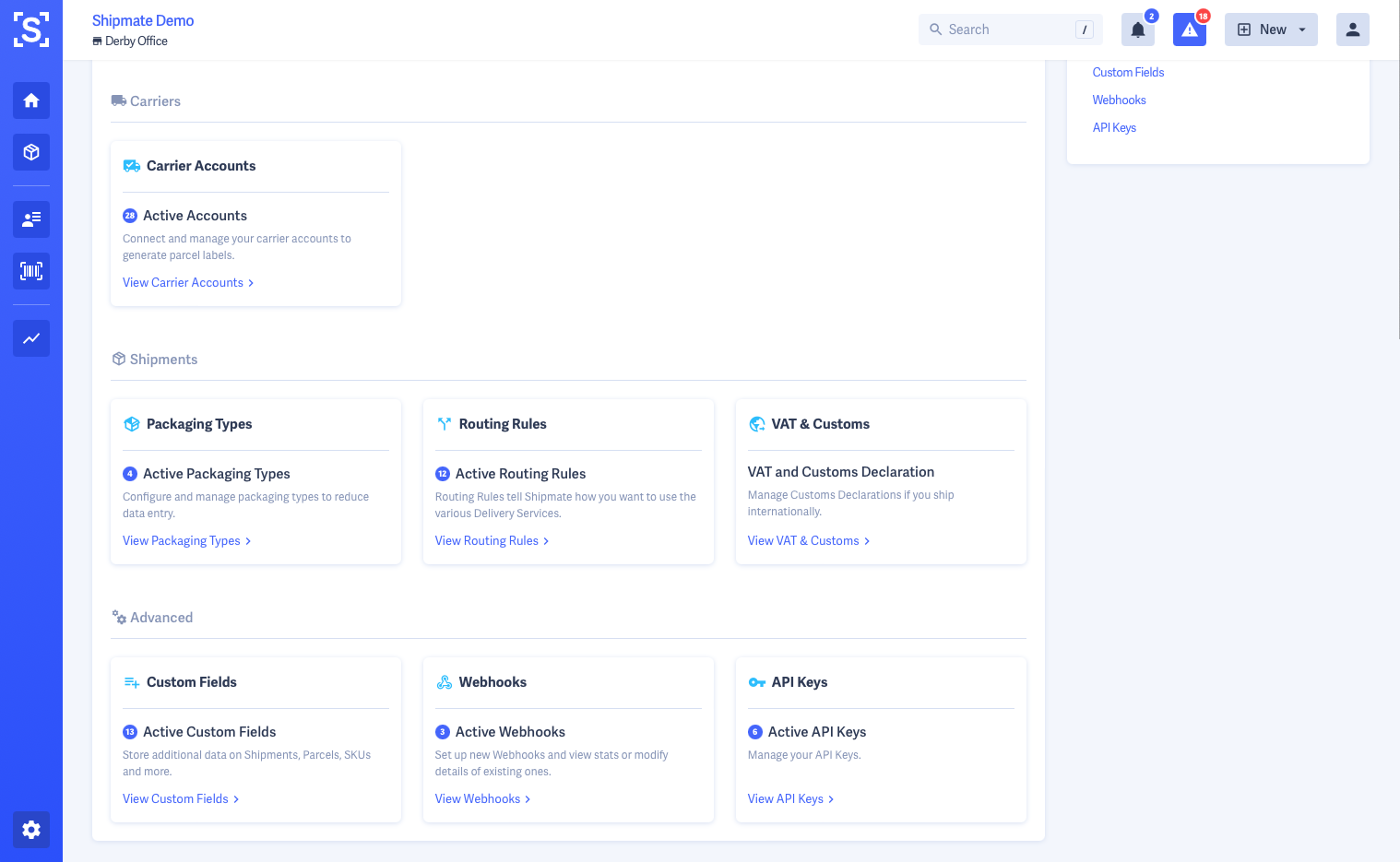
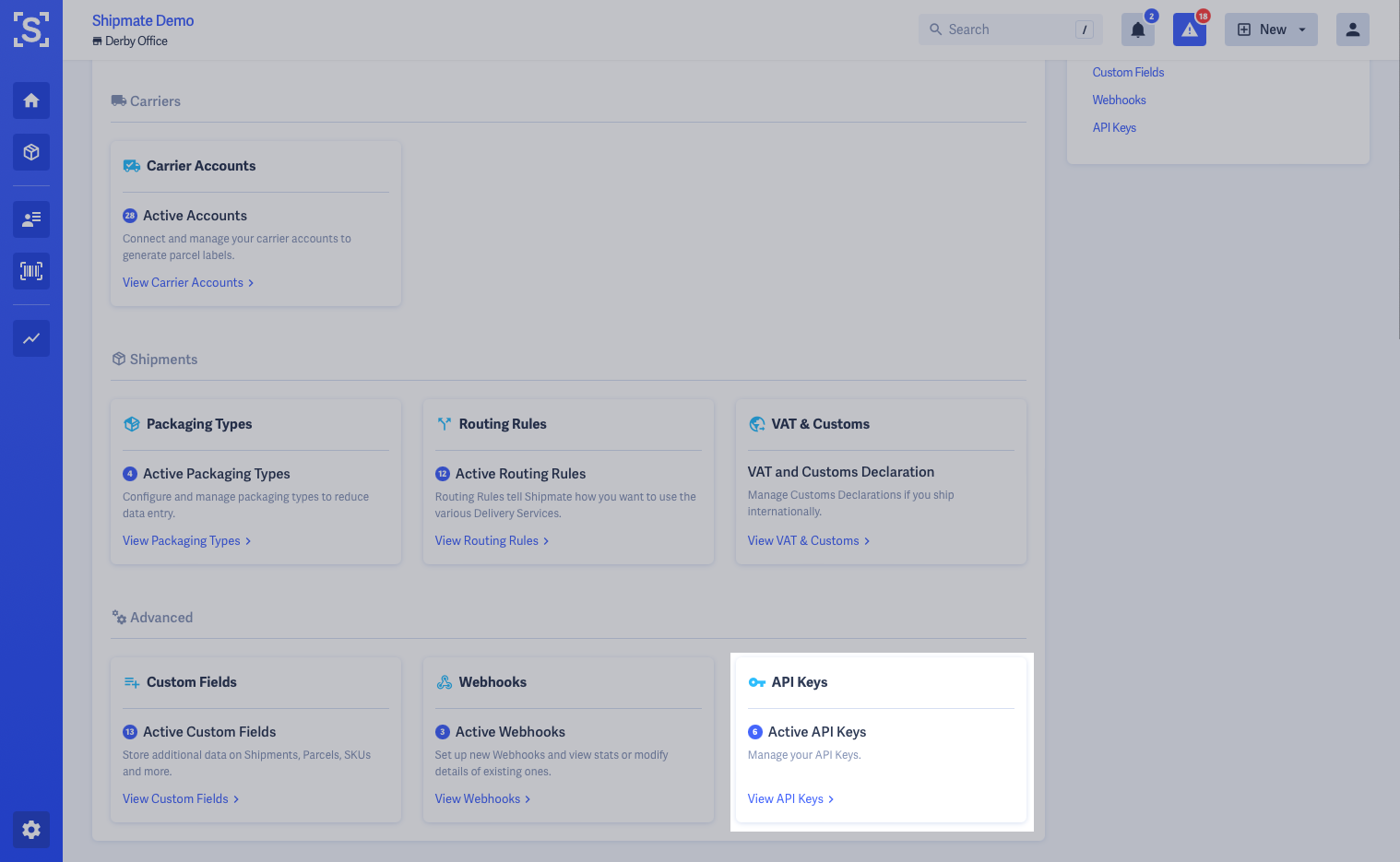
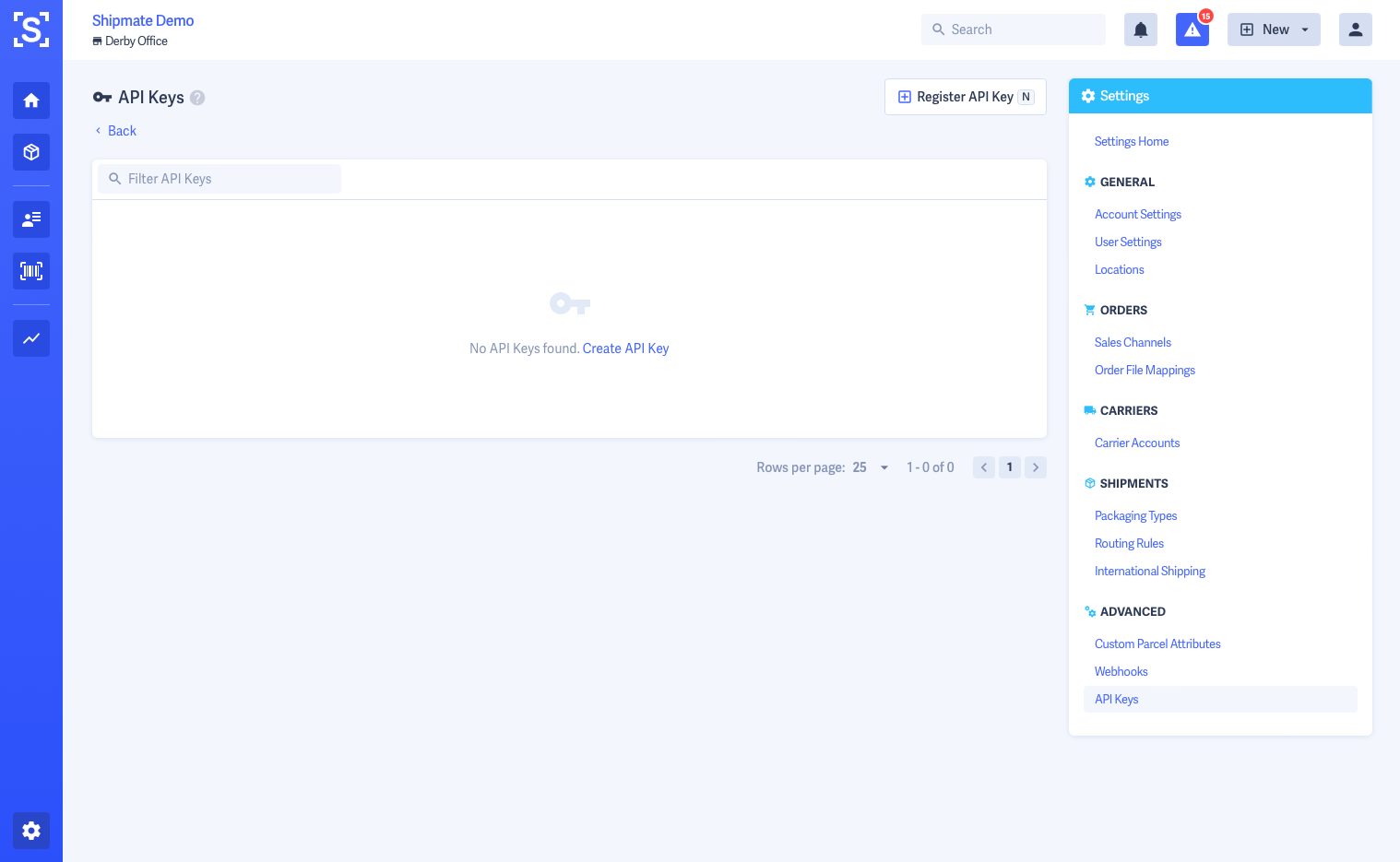
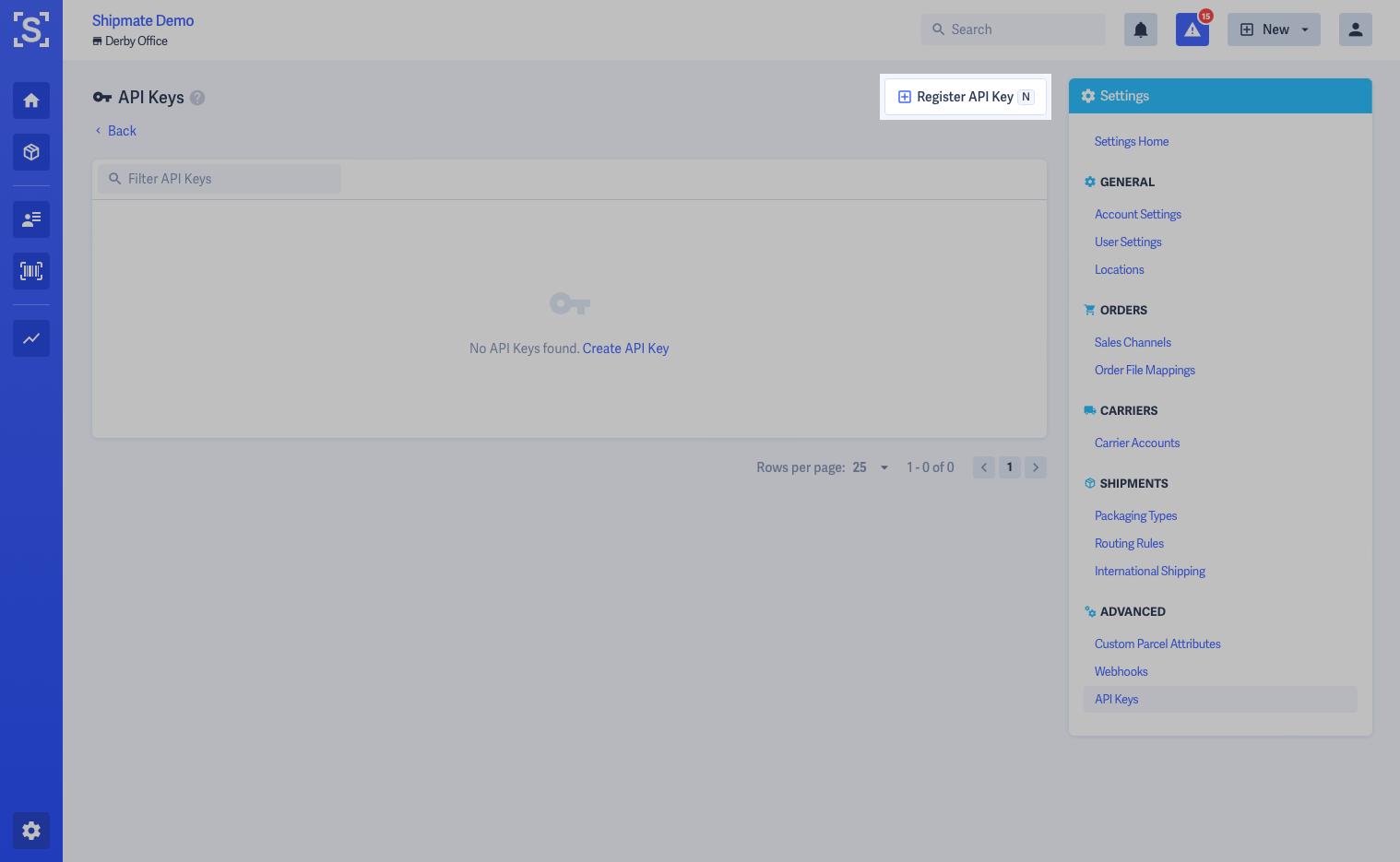
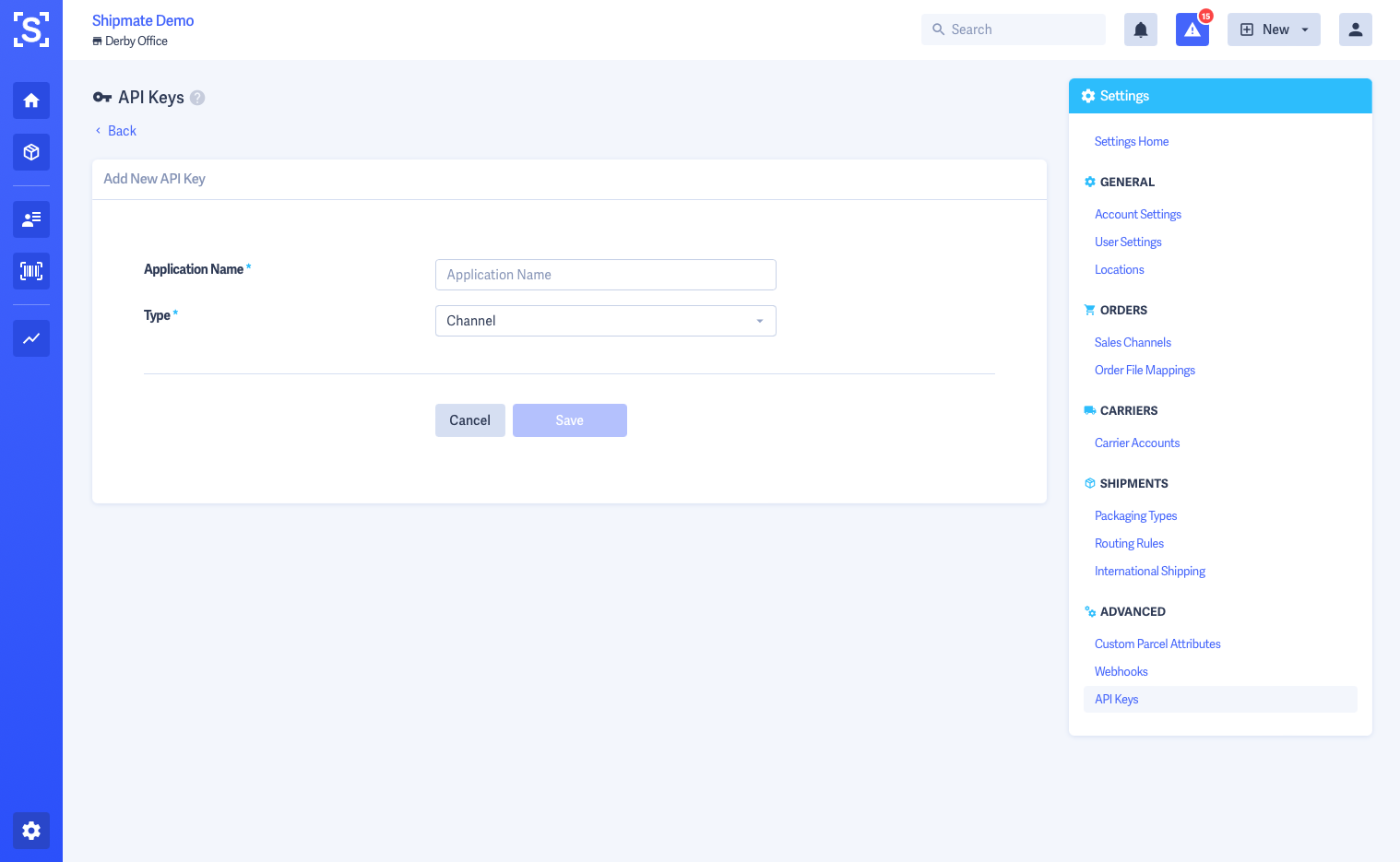
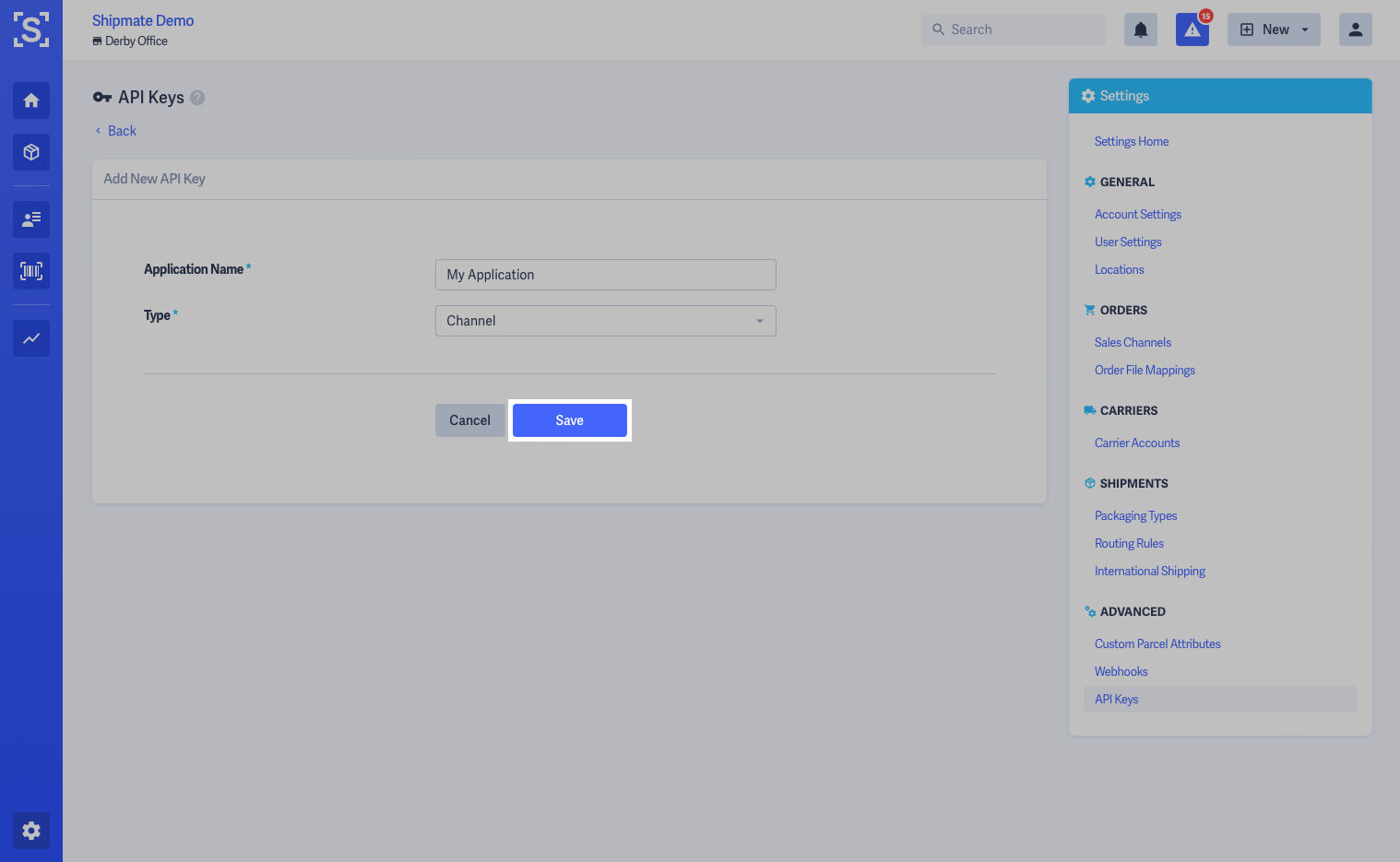
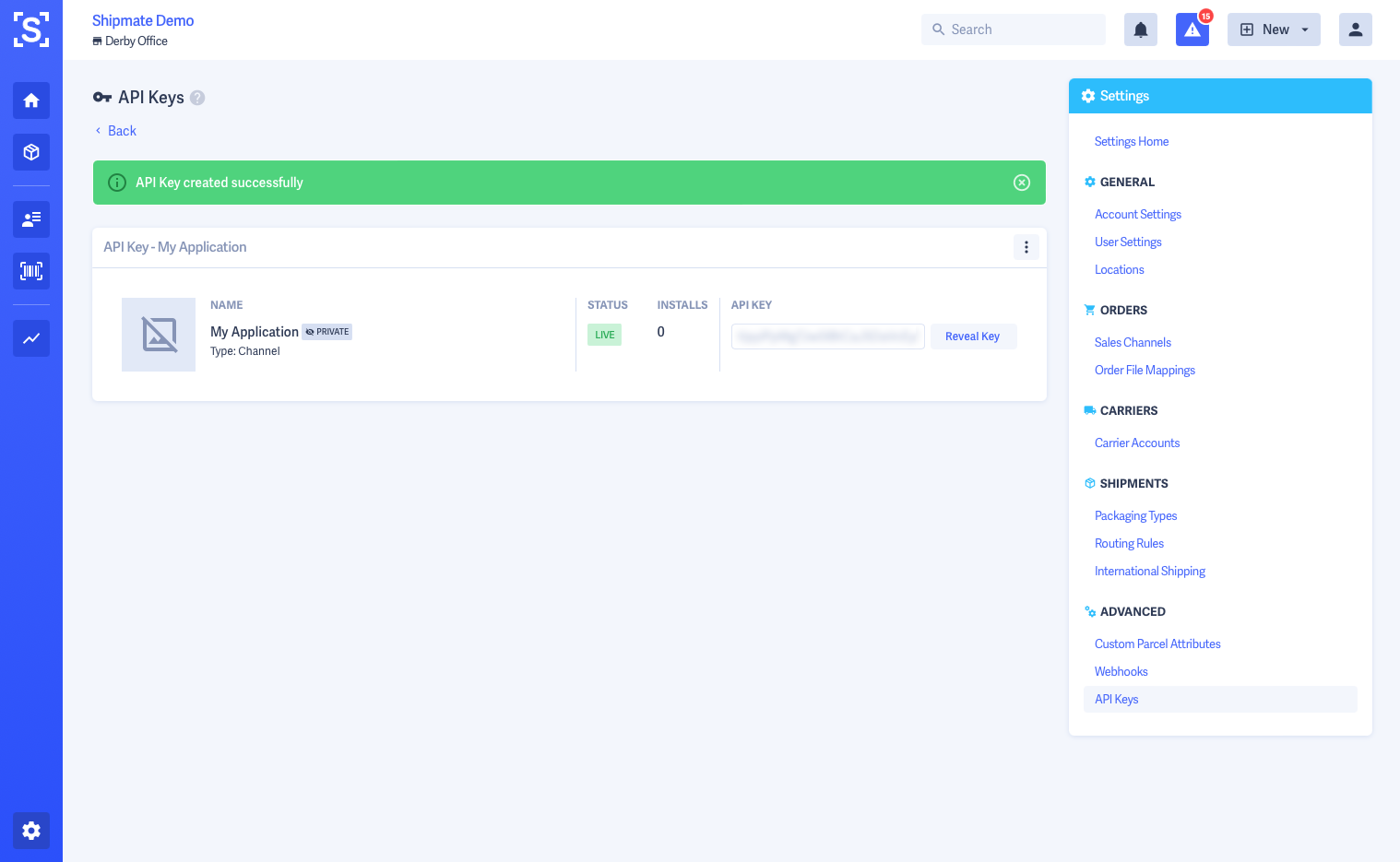
Setting an Application Icon
Icons can be uploaded to applications, providing familiarity for people using your application across Shipmate.
Once you have created your API Key, simply click the empty image icon to begin the upload process. Choose an image from your computer, position it correctly using the on-screen selection tool, then click Upload.
Your icon will then be shown on shipments created using your application, on the individual shipment page. We intend to use app icons across further areas of the Shipmate platform in the coming months.

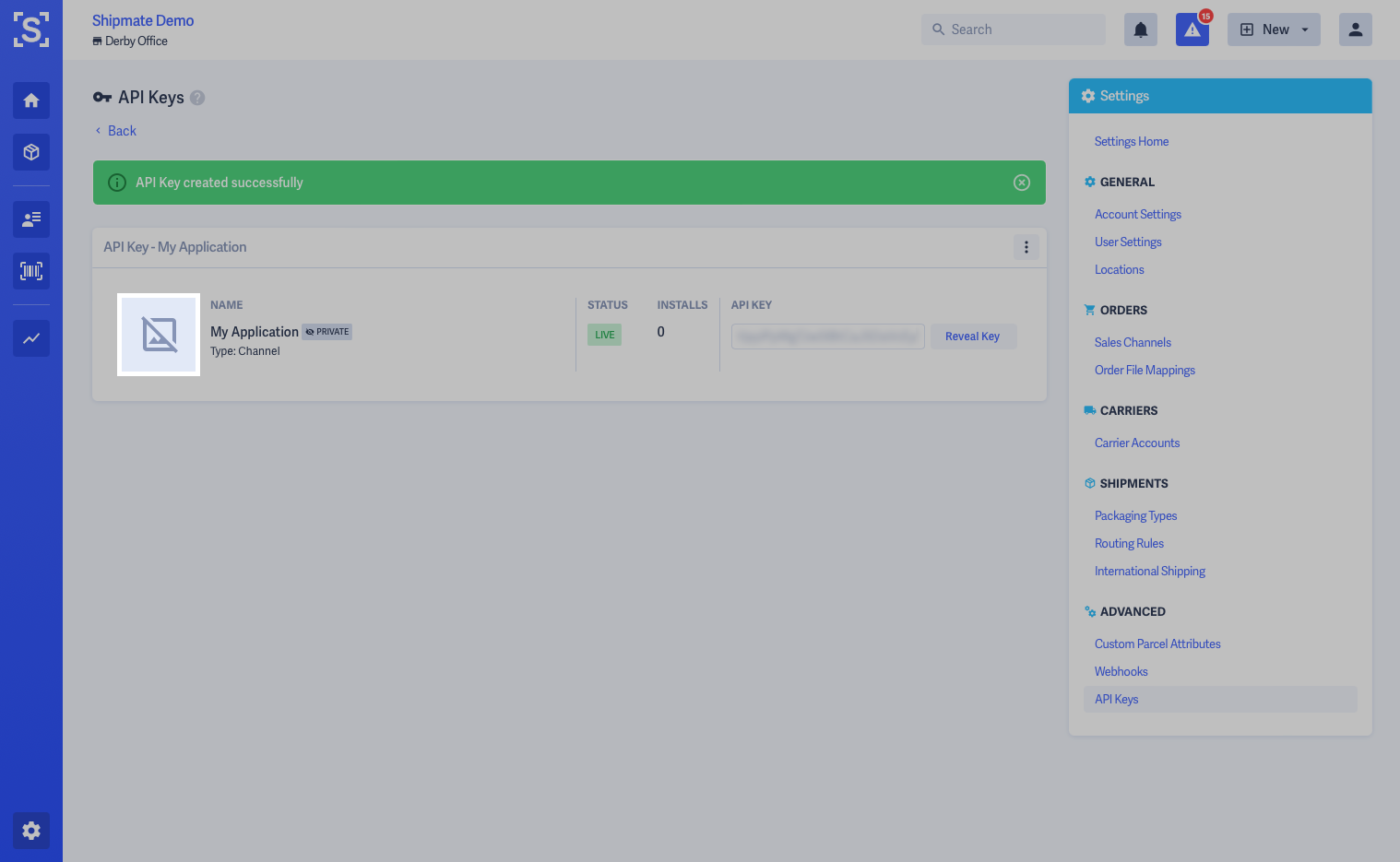
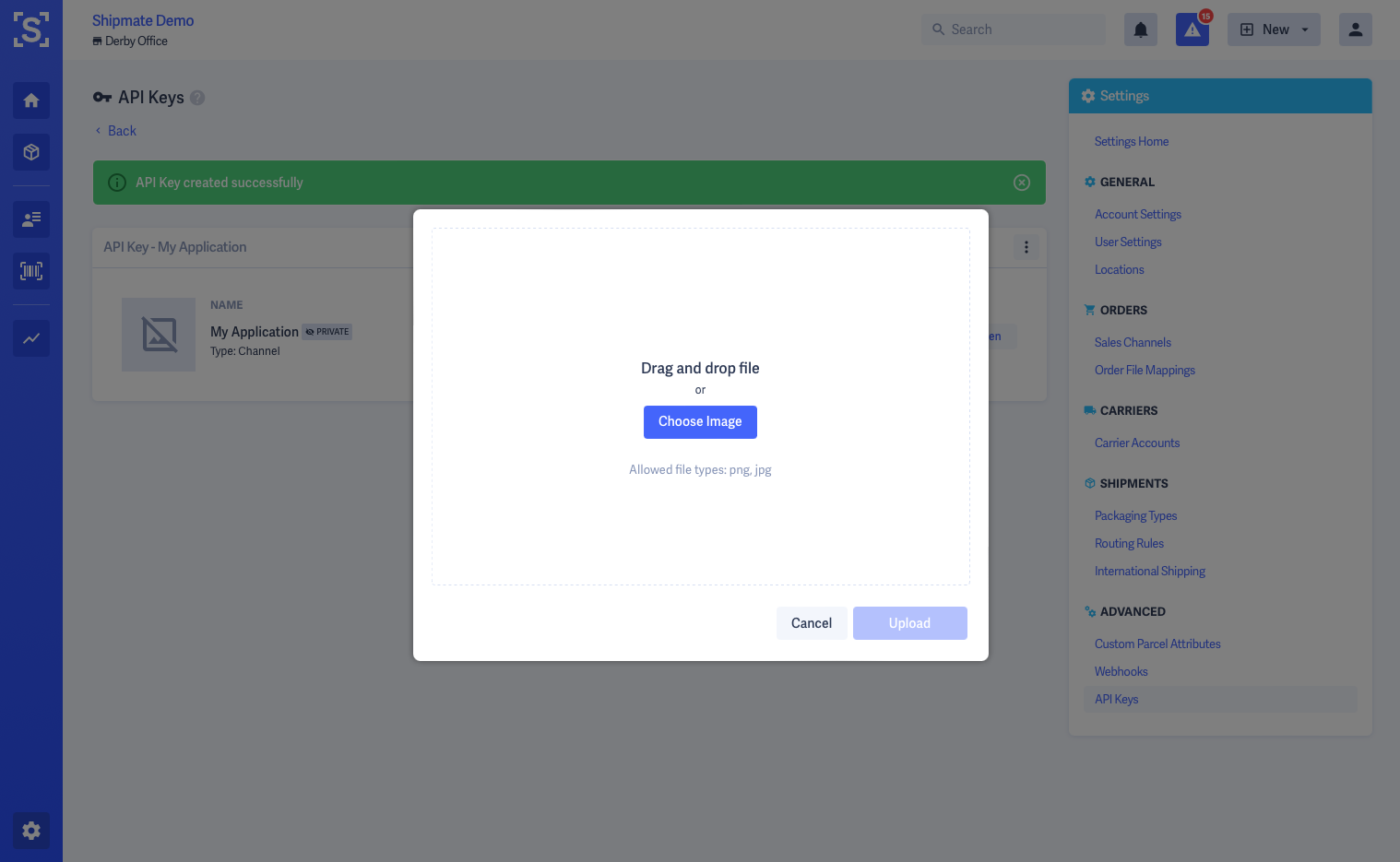
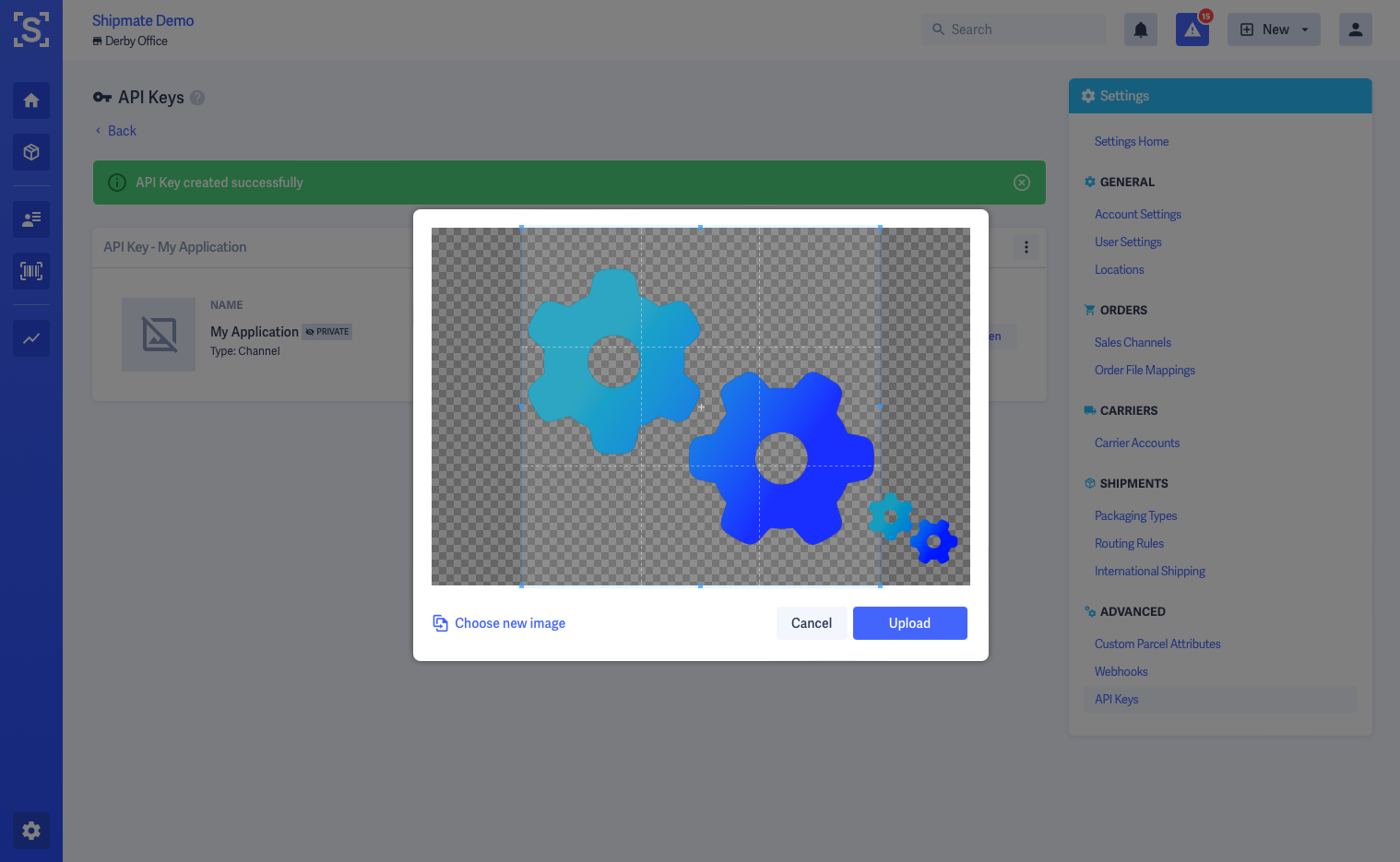
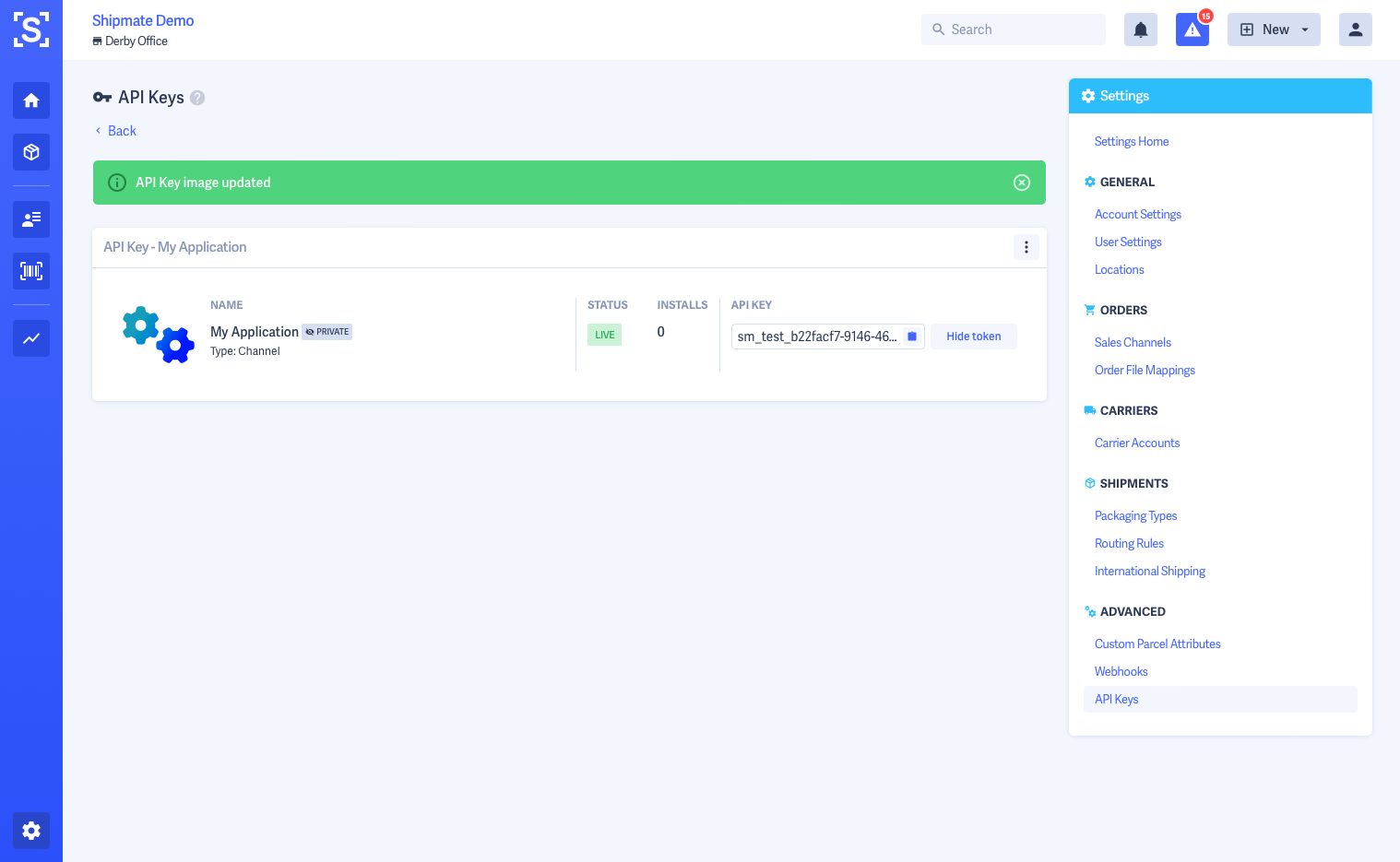
Authentication
POST /tokens
Authentication with the Shipmate API is handled by a secret token obtained by authenticating using a Shipmate username and password. These tokens provide access to the user's account and should not be shared or stored publicly.
You should store the user's token in your application or session and use this in the X-SHIPMATE-TOKEN header with all subsequent requests.
GET /tokens
To check the validity of a token, simply make a GET request to /tokens with the X-SHIPMATE-TOKEN header present in your request.
An HTTP response code of 200 will confirm your session is active.
DELETE /tokens
Tokens are persistent, however you may invalidate them by making a DELETE request to /tokens with the X-SHIPMATE-TOKEN header present in your request.
To obtain a new token, simply use the POST method again.
Example Request:
curl -H "Content-Type: application/json" \
-H "X-SHIPMATE-API-KEY: sm_test_12345abcde-1234-5678-90ab-abcdef0123456" \
-X "POST" \
https://api.shipmate.co.uk/v1.2/tokens -d '
{
"username" : "test@shipmate.co.uk",
"password" : "myShipmatePassword"
}
'Example Response:
{
"message": "Login Successful",
"data": {
"token": "3674eb125fe777d8c152fe52f35e78f2",
"user": {
"id": "caf1e96a- ... -9d10781e",
"user_type": "C",
"first_name": "Joe",
"last_name": "Bloggs",
"email": "test@shipmate.co.uk",
"account_name": "Shipmate Test",
"merchant_id": "fdc2e13b- ... -8a12483c"
}
}
}Developer Resources
Postman Collection
We have prepared a Postman Collection to help you get started developing your API integration with sample requests and examples that follow various scenarios.
You will need to configure 3x Variables in the Collection to be able to use it correctly:
BASE_URL- the URL of the API and environment you wish to useX-SHIPMATE-API-KEY- the API Key you have registered for your applicationX-SHIPMATE-TOKEN- the access token you have obtained through authentication
Composer Package SDK
If you are integrating Shipmate with a PHP application, we recommend using our officially supported SDK via Composer:
composer require shipmate/shipmate-php-sdk
Shipments
Create Shipment
POST /shipments
This method creates a Shipment, generating shipping labels in your desired format and also returns tracking details.
Supply JSON encoded data as per the attributes described in the Shipment object to create your Shipment.
The delivery_service_key attribute is optional. If omitted, your Routing Rules will be used to select the most appropriate Delivery Service.
The location_code attribute is optional. If omitted, the user's Default Location will be used.
The despatch_date attribute is optional. If omitted, the current date will be used.
The customs_declaration, recipient_vat_number and recipient_eori_number attributes are optional for domestic Shipments.
The format attribute is optional. Labels will be returned in ZPL (Zebra Printer Language) as a string by default, or you may opt to retrieve labels in PDF or PNG format, both of which will be returned as a base64 encoded string. If using the print_labels option, labels will be returned in the format selected by the user in the Shipmate Desktop App.
Example Request:
curl -H "Content-Type: application/json" \
-H "X-SHIPMATE-API-KEY: sm_test_12345abcde-1234-5678-90ab-abcdef0123456" \
-H "X-SHIPMATE-TOKEN: 3674eb125fe777d8c152fe52f35e78f2" \
-X "POST" \
-d @body.json \
https://api.shipmate.co.uk/v1.2/shipments
{
"shipment_reference": "80000001",
"delivery_service_key": "DPD_LOCAL_PARCEL_24",
"to_address": {
"name": "Bruce Irvine",
"line_1": "35 Ford Street",
"city": "Derby",
"postcode": "DE1 1EE",
"country": "GB"
},
"parcels": [
{
"reference": "80000001-1",
"weight": 3000,
"width": 20,
"length": 10,
"depth": 15,
"custom_fields": {
"category": "Books",
"is_perishable": false
}
},
...
]
}
Example Response:
{
"message": "Shipment Created",
"data": [
{
"id": "5cc816ce-edad-4e08-aabf-ddcbe1d7ccc2",
"shipment_reference": "80000001",
"parcel_reference": "80000001-1",
"carrier": "DPD Local",
"service_name": "Parcel Next Day",
"tracking_reference": "95008001000001",
"universal_tracking_reference": "P00512300001",
"created_by": "John Smith",
"created_with": "Shipmate Web App",
"created_at": "2024-02-22 13:00:00",
"price": "8.75",
"estimated_delivery_date": "2024-03-01 20:00",
"weight": 2000,
"to_address": {
"delivery_name": "Bruce Irvine",
"line_1": "35 Ford Street",
"line_2": "",
"line_3": "",
"city": "Derby",
"county": "",
"postcode": "DE1 1EE",
"country": "GB"
},
"despatch_location: {
"id": "bae33e4a-5996-423d-acb3-e663e42e6e34",
"code": "DC1",
"name": "Derby Office",
"type": "STORE",
"telephone": "01332 460888",
"email": "derby@shipmate.co.uk",
"address_name": "Shipmate Demo",
"address_line_1": "Shipmate Demo",
"address_line_2": "Friar Gate Studios",
"address_line_3": null,
"address_town_city": "Derby",
"address_county": "Derbyshire",
"address_country": {
"code": "GB",
"name": "United Kingdom"
},
"address_post_zip_code": null,
"default": true,
"created_at": "2021-10-21 10:25:23",
"updated_at": "2024-02-01 11:05:50"
}
"pdf": "",
"zpl": "CT~~CD,~CC^~CT~ ... ^PQ1,0,1,Y^XZ",
"png": ""
}
]
}Get Services for Shipment
POST /shipments/get-services
This method retrieves all suitable services for the supplied Shipment, along with delivery costs. Services are returned in ascending order of the total_price, with the cheapest available service first.
Also returns the recommended_service, which is a copy of the Delivery Service that any Routing Rules have recommended, or otherwise the cheapest service that meets the Shipment's requirements.
Use this method to display options for users to select their desired Delivery Service, or to validate a Shipment.
Supply JSON encoded data as per the attributes described in the Shipment object and the Create Shipment endpoint to retrieve Delivery Services and costings for your Shipment.
Requests made to this endpoint do not count towards your label usage allowance, and we recommended this is used with interactive user interfaces.
Example Response:
{
"message": "Available Services Retrieved",
"data": {
"recommended_service":
{
"carrier": "DPD Local",
"carrier_account": "DPD Local - Primary Account",
"service_name": "Parcel 48 Hours",
"full_service_name": "DPD Local - Primary Account - Parcel 48 Hours",
"service_key": "DPD_LOCAL_PARCEL_48",
"base_price": "7.20",
"additional_parcel_price": "4.00",
"surcharges": "0.00",
"fuel_surcharge": "11.12",
"total_price": "12.32",
"estimated_delivery_date": "2024-03-02 20:00"
},
"services": [
{
"carrier": "DPD Local",
"carrier_account": "DPD Local - Primary Account",
"service_name": "Parcel 48 Hours",
"full_service_name": "DPD Local - Primary Account - Parcel 48 Hours",
"service_key": "DPD_LOCAL_PARCEL_48",
"base_price": "7.20",
"additional_parcel_price": "4.00",
"surcharges": "0.00",
"fuel_surcharge": "11.12",
"total_price": "12.32",
"estimated_delivery_date": "2024-03-02 20:00"
},
{
"carrier": "DPD Local",
"carrier_account": "DPD Local - Primary Account",
"service_name": "Parcel Next Day",
"full_service_name": "DPD Local - Primary Account - Parcel Next Day",
"service_key": "DPD_LOCAL_PARCEL_24",
"base_price": "8.50",
"additional_parcel_price": "5.50",
"surcharges": "0.00",
"fuel_surcharge": "1.40",
"total_price": "15.40",
"estimated_delivery_date": "2024-03-01 20:00"
},
...
]
}
}Cancel Shipment
DELETE /shipments/:ref
Shipments can be cancelled if they have not been manifested for collection. This means the carrier is not advised about the Shipment and they should not charge you for it. Cancelled labels still count towards your Shipmate usage for the purposes of billing.
Supply your Shipment Reference as the :ref identifier in your request.
Example Response:
{
"message": "Shipment Cancelled",
"data": null
}Shipment Object
A Shipment represents the collection of parcels that you want to send for an individual order or shipment. It contains information about the parcels, the delivery service and delivery and collection addresses.
Parameters:| Parameter | Description | Type |
|---|---|---|
shipment_reference |
Your unique reference for the Shipment | String |
order_reference |
The order reference or number given to your customer. May be added to parcel labels and does not need to be unique. | String |
delivery_service_key |
The unique key that you set when generating the Delivery Service in the Shipmate Web Portal. Optional, defaults to Routing Rules. | String |
brand |
Optional Brand key or ID | String |
location_code |
Lets you state which Location you are sending this Shipment from. Optional, defaults to your Default Location. | String |
despatch_date |
The date for the Shipment to be despatched (YYYY-mm-dd HH:ii:ss), defaults to current day | String |
to_address |
The Address that you want to send the Shipment to | Address |
parcels |
An array of Parcels to be sent | Array of Parcels |
delivery_instructions |
Delivery instructions for the Carrier (e.g. Put in porch) | String |
custom_fields |
Array of Custom Fields supplied as key => value pairs - for example "my_custom_field_key": "My Value"Custom Fields can be managed in the Shipmate Web Portal. |
JSON Key/Value |
customs_declaration |
Customs Declaration details, for international destinations, if overriding defaults | Customs Declaration |
recipient_vat_number |
The recipient's VAT number, for international destinations | String |
recipient_eori_number |
The recipient's EORI number, for international destinations | String |
recipient_ukims_number |
The recipient's UKIMS number, for shipments between Mainland UK and Northern Ireland when required | String |
format |
The format of the label to be returned (ZPL, PDF, PNG), defaults to ZPL | String |
print_labels |
Set to true to send generated label(s) to the authenticated user's Shipmate Desktop AppDefault value is false. |
Boolean |
print_to_user |
Optional ID of User you wish to print to.print_labels must be set to true when setting this attribute. |
String |
printer_key |
Optional key of the Printer you wish to print to when using the Shipmate Print Server App. | String |
Parcel Object
A Parcel represents each individual box that is being sent within a Shipment and tracks data such as dimensions, weight, value and contents.
If a Shipment requires a Customs Declaration, item level details need to be supplied. These item attributes are provided along with the delivery and dimension details to the carrier, and can also be printed on a CN22 Customs Declaration forms or Commercial Invoices, if required.
| Parameter | Description | Type |
|---|---|---|
reference |
Your unique reference for the Parcel | String |
packaging_type_key |
If using a Packaging Type, its unique key Optional, not required if supplying weight and dimensions or using a Default Packaging Type. |
String |
weight |
The weight of the Parcel in grammes Required unless supplying packaging_type_key or using a Default Packaging Type. |
Integer |
width |
The width of the Parcel in centimetres Required unless supplying packaging_type_key or using a Default Packaging Type. |
Integer |
length |
The length of the Parcel in centimetres Required unless supplying packaging_type_key or using a Default Packaging Type. |
Integer |
depth |
The depth of the Parcel in centimetres Required unless supplying packaging_type_key or using a Default Packaging Type. |
Integer |
value |
The value of the Parcel's contents in your account's base currency (2 d.p.) | Decimal |
items |
Parcel contents details for customs declarations. Optional for Mainland UK Deliveries. |
Array of Items |
customs_declaration |
Customs Declaration details, for international destinations, if overriding defaults. | Customs Declaration |
custom_fields |
Array of Custom Fields supplied as key => value pairs - for example "my_custom_field_key": "My Value"Custom Fields can be managed in the Shipmate Web Portal. |
JSON Key/Value |
Items Object
Items represent each individual item that is being sent within a Parcel and tracks data such as value and customs declaration details.
If a Shipment requires a Customs Declaration, item level details need to be supplied. These item attributes are provided along with the delivery and dimension details to the carrier, and can also be printed on CN22 Customs Declaration forms or Commercial Invoices, if required.
Alternatively, you may use the SKU Inventory on your Shipmate account to populate all details by conducting a SKU lookup. The SKU number must match exactly the value stored on your SKU Inventory, then all subsequent attributes are optional.
Parameters:| Parameter | Description | Type |
|---|---|---|
item_line_id |
Used to link Items across multiple parcels. Optional, but if value matches the item will be considered to be split across the parcels this value appears. If used, additional validation prevents other non-matching Items appearing in the same Parcel. |
String |
sku |
Attempts a lookup on the SKU Inventory, populating all subsequent attributes on successful match. Optional for Mainland UK Deliveries, or where all subsequent attributes are otherwise provided. |
String |
short_description |
A short description of the parcel contents. Optional for Mainland UK Deliveries, or when using SKU Inventory lookup. Overrides value held on SKU Inventory whenever provided. |
String |
full_description |
The full description of the parcel contents. Optional for Mainland UK Deliveries, or when using SKU Inventory lookup. Overrides value held on SKU Inventory whenever provided. |
String |
country_of_origin |
Country of origin. Full name or ISO Alpha-2 code (e.g., "United Kingdom" or "GB"). Optional for Mainland UK Deliveries, or when using SKU Inventory lookup. Overrides value held on SKU Inventory whenever provided. |
String |
harmonised_code |
Harmonised international trade code / tariff code. Optional for Mainland UK Deliveries, or when using SKU Inventory lookup. Overrides value held on SKU Inventory whenever provided. |
String |
item_weight |
The weight of each item in grammes. Optional for Mainland UK Deliveries, or when using SKU Inventory lookup. Overrides value held on SKU Inventory whenever provided. |
Integer |
item_value |
The value of each item in your account's base currency (2 d.p.). Optional for Mainland UK Deliveries, or when using SKU Inventory lookup. Overrides value held on SKU Inventory whenever provided. |
Decimal |
item_quantity |
The quantity of the item in the parcel. Optional for Mainland UK Deliveries. Defaults to 1 when using SKU Inventory lookup, unless value provided. |
Integer |
Address Object
An Address represents a physical address that will be used for delivery.
Parameters:| Parameter | Description | Type |
|---|---|---|
name |
The name of the recipient | String |
company_name |
The company name of the address | String |
telephone |
The telephone number to contact for the address | String |
email_address |
The email address to contact for the address | String |
line_1 |
The first line of the address | String |
line_2 |
The second line of the address | String |
line_3 |
The third line of the address | String |
city |
The city of the address | String |
county |
The county of the address | String |
postcode |
The postcode of the address | String |
country |
The two character ISO 3166-1 country code of the address | String |
Country Object
The Country object contains the following:
Parameters:| Parameter | Description | Type |
|---|---|---|
code |
The two character ISO 3166-1 country code, e.g., GB | String |
name |
The full name of the country, e.g., United Kingdom | String |
Customs Declaration Object
The Customs Declaration object contains the following:
Parameters:| Parameter | Description | Type |
|---|---|---|
duty_method |
Whether this is DAP or DDP. Defaults to value on account. Accepts only DAP or DDP. |
String |
commercial_invoice_number |
Defaults to Order Reference. | String |
insurance_value |
Used to populate Commercial Invoice. Defaults to 0.00. | Decimal |
freight_value |
Used to populate Commercial Invoice. Defaults to 0.00. | Decimal |
packing_value |
Used to populate Commercial Invoice. Defaults to 0.00. | Decimal |
handling_value |
Used to populate Commercial Invoice. Defaults to 0.00. | Decimal |
other_value |
Used to populate Commercial Invoice. May be a negative value for discounts. Defaults to 0.00. | Decimal |
currency_code |
Used to populate Commercial Invoice. Defaults to account value. Accepts ISO currency code e.g., GBP, EUR. |
String |
export_license_number |
Used to populate Commercial Invoice. Optional. | String |
export_certificate_number |
Used to populate Commercial Invoice. Optional. | String |
other_export_comments |
Used to populate Commercial Invoice. Optional, accepts up to 1,000 characters. | String |
export_purpose |
Export Purpose for customs declaration | Export Purpose |
Export Purpose Object
The Export Purpose object contains the following:
Parameters:| Parameter | Description | Type |
|---|---|---|
gift |
True if this Parcel contains a Gift | Boolean |
documents |
True if this Parcel contains Documents | Boolean |
sale_of_goods |
True if this Parcel is for Sale of Goods | Boolean |
commercial_sample |
True if this Parcel contains a Commercial Sample | Boolean |
returned_goods |
True if this Parcel contains Returned Goods | Boolean |
other |
Other export purpose, if not represented by one of the above options. | String |
Shipment Response Object
The Shipment Response object contains the following:
Parameters:| Parameter | Description | Type |
|---|---|---|
id |
Unique system identifier | String |
shipment_reference |
The supplied Shipment Reference | String |
parcel_reference |
The supplied Parcel Reference (or reference of first Parcel) | String |
carrier |
The name of the Carrier Account used | String |
service_name |
The name of the Delivery Service used | String |
tracking_reference |
Tracking reference of Shipment or first Parcel | String |
universal_tracking_reference |
Shipmate-generated tracking reference of Shipment | String |
created_by |
Name of user who created the Shipment | String |
created_with |
Name of the application that was used to create the Shipment | String |
created_at |
Timestamp when the Shipment was created | Datetime |
price |
Delivery Cost | Decimal |
estimated_delivery_date |
When the shipment should be delivered by | Datetime |
weight |
First parcel weight, in grammes | Integer |
container_reference |
Output as part of response if this Shipment is part of a container | String |
to_address |
Recipient Address | Address |
despatch_location |
Despatch Location | Location |
pdf |
base64 encoded string of PDF document file of labels | String |
zpl |
Zebra-compatible ZPL printer code string of labels | String |
png |
base64 encoded string array of PNG graphics files of labels | String[] |
Users
User Object
The following User representation is available on the Shipmate API:
Parameters:| Parameter | Description | Type |
|---|---|---|
id |
Unique system identifier | String |
title |
e.g., Mr, Miss, Mrs, Mx | String |
first_name |
The user's first name | String |
last_name |
The user's last name | String |
email |
The user's email address | String |
profile_image_url |
URL to the user's profile image | String |
location |
The user's currently assigned Location | Location |
access_level |
The user's access level, one of MERCHANT_ADMIN, MERCHANT_USER, 3PL_ADMIN, 3PL_USER | String |
printer_online |
Returns true if the user currently has the Desktop Printer App running |
Boolean |
Get Users
GET /users
Retrieves a list of Users on the Shipmate account.
Example Response:
{
"data": [
{
"id": "caf1e96a- ... -9d10781e",
"title": "Mr",
"first_name": "Shipmate",
"last_name": "Demo",
"email": "demo@shipmate.co.uk",
"profile_image_url": "https://shipmate-user-profile-images... .png",
"location": {
"id": "bae33e4a-5996-423d-acb3-e663e42e6e34",
"code": "DC1",
"name": "Derby Office",
"type": "STORE",
"telephone": "01332 460 888",
"email": "derby@shipmate.co.uk",
"address_name": "Shipmate Derby Office",
"address_line_1": "Shipmate",
"address_line_2": "Friar Gate Studios",
"address_line_3": null,
"address_town_city": "Derby",
"address_county": "Derbyshire",
"address_country": {
"code": "GB",
"name": "United Kingdom"
},
"address_post_zip_code": "DE1 1EE",
"default": true,
"created_at": "2021-10-21 10:25:23",
"updated_at": "2023-05-29 11:39:16"
},
"access_level": "MERCHANT_ADMIN",
"printer_online": true
},
...
]
}Locations
Location Object
These represent the Locations you have set up in your Shipmate account.
A Location is used when creating a Shipment to set the address and contact details of the source or collection address of the delivery, with these details typically appearing in the sender section of shipping labels when supported by the carrier.
If a Location is not specified, the account's Default Location is used for the Shipment.
Parameters:| Parameter | Description | Type |
|---|---|---|
id |
Unique system identifier | String |
code |
Location code e.g., HQ | String |
name |
Location name e.g., Headquarters | String |
type |
Type of Location e.g., Store or Warehouse | String |
telephone |
Telephone number for the Location | String |
email |
Email address for the Location | String |
address_name |
Company or FAO name for Location | String |
address_line_1 |
Address line 1 of Location | String |
address_line_2 |
Address line 2 of Location | String |
address_line_3 |
Address line 3 of Location | String |
address_town_city |
Town or city of Location | String |
address_county |
County of Location | String |
address_country |
Country of Location | Country |
address_post_zip_code |
Postcode of Location | String |
default |
Whether this is the account's default Location | Boolean |
created_at |
When the Location was first created on Shipmate | Datetime |
updated_at |
When the Location was last updated on Shipmate | Datetime |
Get All Locations
GET /locations
Retrieves a list of all Locations on the Shipmate account.
Example Response:
{
"message": "Locations",
"data": {
"data": [
{
"id": "bae33e4a-5996-423d-acb3-e663e42e6e34",
"code": "DC1",
"name": "Derby Office",
"type": "STORE",
"telephone": "01332 460888",
"email": "derby@shipmate.co.uk",
"address_name": "Shipmate Demo",
"address_line_1": "Shipmate Demo",
"address_line_2": "Friar Gate Studios",
"address_line_3": null,
"address_town_city": "Derby",
"address_county": "Derbyshire",
"address_country": {
"code": "GB",
"name": "United Kingdom"
},
"address_post_zip_code": null,
"default": true,
"created_at": "2021-10-21 10:25:23",
"updated_at": "2024-02-01 11:05:50"
},
{
"id": "6d894299-e3e6-4c4a-8b07-925d40b67f28",
"code": "DC2",
"name": "Manchester Office",
"type": "OTHER",
"telephone": "0161 883 0383",
"email": "manchester@shipmate.co.uk",
"address_name": "Shipmate",
"address_line_1": "Bonded Warehouse",
"address_line_2": "18 Lower Byrom Street",
"address_line_3": null,
"address_town_city": "Manchester",
"address_county": null,
"address_country": {
"code": "GB",
"name": "United Kingdom"
},
"address_post_zip_code": null,
"default": false,
"created_at": "2021-11-22 15:03:29",
"updated_at": "2024-02-01 11:05:50"
}
]
}
}Get Single Location
GET /locations/:ref
Retrieves a specific Location on the Shipmate account by :ref, which may be either the Location code or ID.
Brands
Brand Object
The following Brand representation is available on the Shipmate API:
Parameters:| Parameter | Description | Type |
|---|---|---|
id |
Unique system identifier | String |
name |
The brand name e.g., My Brand | String |
key |
The unique brand key used in requests e.g., MYBRAND |
String |
return_address_line_1 |
The return address used on labels whenever possible | String |
return_address_line_2 |
The return address used on labels whenever possible | String |
return_address_line_3 |
The return address used on labels whenever possible | String |
return_address_town_city |
The return address used on labels whenever possible | String |
return_address_county |
The return address used on labels whenever possible | String |
return_address_postcode |
The return address used on labels whenever possible | String |
return_address_country |
The return address used on labels whenever possible | Country |
return_phone |
The returns phone number used on labels whenever possible | String |
return_email |
The returns email address used on labels whenever possible | String |
profile_image_url |
URL to the brand profile image | String |
customer_despatch_notes |
The notes used on Despatch Note documents | Location |
default |
true if this is the default Brand on the account |
Boolean |
tracking_portal_base_url |
The base URL to this brand's tracking portal | String |
Get Brands
GET /brands
Retrieves a list of Brands on the Shipmate account.
Example Response:
{
"message": "Brands Retrieved",
"data": [
{
"id": "63303429-2702-4c8d-b688-b02d681a6a4c",
"name": "Shipmate",
"key": "SHIP",
"return_address_line_1": "Shipmate",
"return_address_line_2": "Friar Gate Studios",
"return_address_line_3": null,
"return_address_town_city": "Derby",
"return_address_county": "Derbyshire",
"return_address_postcode": "DE1 1EE",
"return_address_country": {
"code": "GB",
"name": "United Kingdom"
},
"return_phone": "01332 460888",
"return_email": "support@shipmate.co.uk",
"profile_image_url": "https://shipmate-brand-uploads-dev.s3.eu-west-1.amazonaws.com/63303429-2702-4c8d-b688-b02d681a6a4c/983e6730-d002-4191-ba5c-095184642b41.png",
"customer_despatch_notes": "Problem with your order? Email support@shipmate.co.uk and we will do what we can to help you.",
"default": true,
"tracking_portal_base_url": "tracking.shipmate.co.uk"
},
{
"id": "ef3f1f29-18bc-4ce6-a009-00853e1cf4f2",
"name": "My Brand",
"key": "MYBRAND",
"return_address_line_1": "My Brand Demo",
"return_address_line_2": "Friar Gate Studios",
"return_address_line_3": null,
"return_address_town_city": "Derby",
"return_address_county": "Derbyshire",
"return_address_postcode": "DE1 1EE",
"return_address_country": {
"code": "GB",
"name": "United Kingdom"
},
"return_phone": "01332 460888",
"return_email": "support@shipmate.co.uk",
"profile_image_url": "https://shipmate-brand-uploads-dev.s3.eu-west-1.amazonaws.com/ef3f1f29-18bc-4ce6-a009-00853e1cf4f2/ce60755a-1af6-425b-b52b-e52a0c1322c6.png",
"customer_despatch_notes": "Problem with your order? Contact support@shipmate.co.uk or call 01332 460888 for help.",
"default": false,
"tracking_portal_base_url": "tracking.mybrand.com"
}
]
}Get Single Brand
GET /brands/:ref
Retrieves a single Brand from the account where :ref is either the key or id of the individual Brand.
For example, both the following requests yield the same response:
GET /brands/SHIP
GET /brands/63303429-2702-4c8d-b688-b02d681a6a4c
Example Response:
{
"message": "Brand Retrieved",
"data": {
"id": "63303429-2702-4c8d-b688-b02d681a6a4c",
"name": "Shipmate",
"key": "SHIP",
"return_address_line_1": "Shipmate",
"return_address_line_2": "Friar Gate Studios",
"return_address_line_3": null,
"return_address_town_city": "Derby",
"return_address_county": "Derbyshire",
"return_address_postcode": "DE1 1EE",
"return_address_country": {
"code": "GB",
"name": "United Kingdom"
},
"return_phone": "01332 460888",
"return_email": "support@shipmate.co.uk",
"profile_image_url": "https://shipmate-brand-uploads-dev.s3.eu-west-1.amazonaws.com/63303429-2702-4c8d-b688-b02d681a6a4c/983e6730-d002-4191-ba5c-095184642b41.png",
"customer_despatch_notes": "Problem with your order? Email support@shipmate.co.uk and we will do what we can to help you.",
"default": true,
"tracking_portal_base_url": "tracking.shipmate.co.uk"
}
}Services
Delivery Service Object
Services represent Delivery Services that you have set up in your Shipmate Account. A Service is used when creating a Shipment to specify how it should be sent.
A Service has conditions that must be met in order to use it. Service conditions merge those conditions specified by the Carrier and yourself in the Shipmate Web Application. Explanations of each field can be seen in the table to the right.
Parameters:| Parameter | Description | Type |
|---|---|---|
id |
The ID of the Service in Shipmate | String |
carrier |
The Carrier that the Service belongs to | String |
name |
The readable name of the Service | String |
description |
The readable description of the Service | String |
key |
The unique key that you set when generating the Delivery Service in the Shipmate Web Application | String |
price |
The price of the delivery based on cost metrics you have configured (format "0.00") | String |
conditions |
An array of conditions that must be met in order to use the Service | Array |
Shipmate Service Conditions Structure:
field |
The field to compare against, e.g. Weight, Length, Volume |
operator |
The operator that should be used in the comparison, e.g. =, >, <= |
value |
The value that should be compared. |
Get Delivery Services
GET /services
The Get Services request will return an array of Delivery Services that have been set up in your Shipmate Account and are currently available to use.
You can optionally supply an array of parcel data that will be used to filter the returned Delivery Services, ensuring that any returned are valid for your Parcel
Parameters:| Parameter | Description | Type |
|---|---|---|
weight |
The weight of your parcel in grammes | Integer |
length |
The length of your parcel in centimetres | Integer |
depth |
The depth of your parcel in centimetres | Integer |
width |
The width of your parcel in centimetres | Integer |
Example Response:
{
"message": "Services Retrieved",
"data": [
{
"id": "cf578671-c9b6-4e96-b836-22dd8b9cb043",
"name": "Packet Next Day",
"description": "Packet Next Day (Under 900g)",
"key": "PACKETNEXT",
"carrier": "EVRI",
"conditions": [
[
"Weight",
"<",
"900"
]
]
},
{
"id": "ef7db004-2840-42f5-ad24-8033634c829e",
"name": "Parcel Next Day",
"description": "Parcel Next Day (900g and over)",
"key": "PARCELNEXT",
"carrier": "EVRI",
"conditions": [
[
"Weight",
">=",
"900"
]
]
},
{
"id": "72dc391b-4550-4ac5-9575-7326de7935cb,
"name": "Two Day",
"description": "Two Day Delivery",
"key": "TWODAY",
"carrier": "EVRI",
"conditions": [
[
"Weight",
"<=",
"15000"
]
]
},
{
"id": "8d33af9b-bf03-474c-a4b5-c8d50ca1fe9e",
"name": "DPD Next Day",
"description": "DPD Next Day",
"key": "DPDNEXT",
"carrier": "DPD",
"conditions": []
}
]
}Custom Fields
Custom Field Object
Custom Fields can be used across the Shipmate platform and can be used to supply custom information to carriers, invoke specific Routing Rules or display information on labels, as just a few examples.
Custom Fields may be configured inside the Shipmate web portal, or via API.
Parameters:| Parameter | Description | Type |
|---|---|---|
name |
The name of the Custom Field | String |
key |
The unique key for the Custom Field, used as the key in key => value pairs | String |
entity |
The entity on Shipmate this Custom Field is for. Can be one of SHIPMENT, PARCEL, CONTACT or SKU. |
String |
data_type |
The type of data being held in this Custom Field - see the Data Types table | String |
source |
The source of the data: DIRECT - the data will be supplied by API or CSV file FIXED - the data will always have the same default_value MAPPED - the data is mapped to another attribute or custom field specified in mapped_to |
String |
mapped_to |
The key of another Custom Field, if source is MAPPED. |
String |
default_value |
The value to apply to the Custom Field if data is not supplied. Acts as the fixed value if source is FIXED. |
String |
data_validation_rules |
Optional validation you wish to apply to data used on this Custom Field. | Validation Rules |
Custom Field Data Types:
| Type | Key | Description |
|---|---|---|
Numeric |
NUMERIC | Any numeric value can be supplied |
Text |
TEXT | Any text value can be supplied |
Boolean |
BOOLEAN | A true or false value can be supplied |
List |
LIST | The supplied value must be in a supplied list |
Validation Rules Object
If additional validation is required for data entered into Custom Fields, it may be configured using the following options:
Parameters:| Parameter | Description | Type |
|---|---|---|
is_required |
If data is required for this Custom Field. Can be set for all Data Types. |
Boolean |
min_length |
States the minimum length of a string. Can be set when data_type is TEXT |
Integer |
max_length |
States the maximum length of a string. Can be set when data_type is TEXT |
Integer |
regex |
States a Perl-compatible Regular Expression the supplied data must match. Can be set when data_type is TEXT |
String |
options |
Accepts comma separated, quote encapsulated (and escaped) list of options. Can be set when data_type is LIST |
String |
numeric_type |
States the type of number to expect - INT or DECIMAL. Can be set when data_type is NUMERIC |
String |
min_value |
States the minimum value. Can be set when data_type is NUMERIC |
Decimal |
max_value |
States the maximum value. Can be set when data_type is NUMERIC |
Decimal |
Get Custom Fields
GET /custom-fields
Retrieves an array of Custom Fields available on the account.
Example Response:
{
"message": "Custom Fields Retrieved",
"data": [
{
"id": "f013e83c-7dcf-49e6-9718-06763d4be577",
"name": "ORDERS-TEXT-FIXED",
"key": "ORDERS-TEXT-FIXED",
"entity": "ORDER",
"data_type": "TEXT",
"default_value": "Fixed value to always use",
"mapped_to": null
},
{
"id": "6cc816ce-edad-4e08-aabf-ddcbe1d7ccc1",
"name": "SKUS-TEXT-FIXED",
"key": "SKUS-TEXT-FIXED",
"entity": "SKU",
"data_type": "TEXT",
"default_value": "Fixed value to always use",
"mapped_to": null
}
]
}Get Single Custom Field
GET /custom-fields/:ref
Retrieves a single Custom Field from the account where :ref is either the key or id of the individual Custom Field.
For example, both the following requests yield the same response:
GET /custom-fields/6cc816ce-edad-4e08-aabf-ddcbe1d7ccc1
GET /custom-fields/SKUS-TEXT-FIXED
Example Response:
{
"message": "Custom Field Retrieved",
"data": [
{
"id": "6cc816ce-edad-4e08-aabf-ddcbe1d7ccc1",
"name": "SKUS-TEXT-FIXED",
"key": "SKUS-TEXT-FIXED",
"entity": "SKU",
"data_type": "TEXT",
"default_value": "Fixed value to always use",
"mapped_to": null
}
]
}Create Custom Field
POST /custom-fields
Creates a new Custom Field on the account.
Supply JSON encoded data as per the attributes described in the Custom Field object to create your Shipment.
Example Request:
curl -H "Content-Type: application/json" \
-H "X-SHIPMATE-API-KEY: sm_test_12345abcde-1234-5678-90ab-abcdef0123456" \
-H "X-SHIPMATE-TOKEN: 3674eb125fe777d8c152fe52f35e78f2" \
-X "POST" \
-d @body.json \
https://api.shipmate.co.uk/v1.2/custom-fields
{
"name": "SKU Text Fixed Field",
"key": "SKU-TEXT-FIXED",
"entity": "SKU",
"data_type": "TEXT",
"source": "FIXED",
"default_value": "Fixed value to always use"
}Example Response:
{
"message": "Custom Field created",
"data": {
"id": "c9b61ad1-a5f8-4dff-88d6-076ac5745b55",
"entity": "SKU",
"name": "SKU Text Fixed Field",
"key": "SKU-TEXT-FIXED",
"data_type": "TEXT",
"default_value": "Fixed value to always use",
"mapped_to": null
}
}Packaging Options
Get Packaging Options
GET /packaging-options
The Get Packaging Options request will return your Packaging Options, along with an array of available Packaging Types that can be used when creating a Shipment. You may optionally provide the key of the Packaging Type you wish to use as the packaging_type_key attribute for each parcel within your Shipment.
If the allow_override option is set to true, you may provide the weight and individual parcel dimensions in your POST /shipments requests, otherwise you must supply a packaging_type_key, or the default Packaging Type dimensions will be used.
If the net_weight option is set to true, the packaging_weight of the chosen Packaging Type is added to the supplied weight of the parcel, or otherwise added to the default_weight value of the Packaging Type when the Shipment is created.
All weight values are in grammes and all dimension values are in mm.
Example Response:
{
"message": "Packaging Options",
"data": [
"net_weight": true,
"allow_override": true,
"packaging_types": [
{
"name": "Small Box",
"key": "BOX_SMALL",
"default": false,
"internal_width": 145,
"internal_height": 145,
"internal_depth": 75,
"external_width": 150,
"external_height": 150,
"external_depth": 80,
"max_weight": 2000,
"default_weight": 1200,
"packaging_weight": 60
},
{
"name": "Medium Box",
"key": "BOX_MEDIUM",
"default": false,
"internal_width": 345,
"internal_height": 295,
"internal_depth": 245,
"external_width": 350,
"external_height": 300,
"external_depth": 250,
"max_weight": 10000,
"default_weight": 10000,
"packaging_weight": 100
},
{
"name": "Large Box",
"key": "BOX_LARGE",
"default": false,
"internal_width": 495,
"internal_height": 495,
"internal_depth": 395,
"external_width": 500,
"external_height": 500,
"external_depth": 400,
"max_weight": 20000,
"default_weight": 20000,
"packaging_weight": 250
},
]
]
}SKUs
SKU Object
A SKU represents a stock keeping unit or product that you will despatch in orders.
Parameters:| Parameter | Description | Type |
|---|---|---|
id |
Unique system identifier | String |
sku |
SKU number used to match on your other systems | String |
image_url |
URL of Image of this SKU | String |
product_name |
The name of the product | String |
outer_barcode |
Barcode used on the containing packaging of the product | String |
inner_barcode |
Barcode used on the product | String |
product_code |
The manufacturer's product number or code | String |
description_short |
A short description of the product | String |
description_full |
The full description of the product | String |
department |
Department name or code for categorisation | String |
category |
Category name | String |
location |
The Location this SKU is held at | Location |
warehouse_location |
Storage location code to help you locate SKU | String |
tariff_code |
Harmonised Code or Tariff Code for Customs Declarations | String |
tariff_description |
Product description for Customs Declarations | String |
country_of_origin |
Country of Origin for Customs Declarations | Country |
manufacturer_name |
Manufacturer name | String |
part_number |
Manufacturer part number | String |
value_ex_vat |
Value of SKU excluding VAT | Decimal |
vat_rate |
The VAT Rate of this SKU | Decimal |
value_inc_vat |
Value of SKU including VAT | Decimal |
gross_weight |
Gross weight of SKU, in grammes | Integer |
net_weight |
Net weight of SKU, in grammes | Integer |
width |
Width of SKU, in mm | Integer |
length |
Length of SKU, in mm | Integer |
depth |
Depth of SKU, in mm | Integer |
active |
Whether this item is currently active in your inventory | Boolean |
is_stocked_item |
Whether this is an item kept in stock | Boolean |
in_stock |
Whether this item is currently in stock | Boolean |
custom_fields |
Array of key => value pairs | JSON Key/Value |
item_handling |
PACKABLE or NON_PACKABLE | String |
created_at |
Date and time SKU was created | Datetime |
updated_at |
Date and time SKU was last updated | Datetime |
Create SKU
POST /skus
Adds a new SKU to the Shipmate account.
Required attributes are highlighted and starred.
Parameters:| Parameter | Description | Type |
|---|---|---|
sku |
SKU number used to match on your other systems | String |
image_url |
URL of Image of this SKU | String |
product_name |
The name of the product | String |
outer_barcode |
Barcode used on the containing packaging of the product | String |
inner_barcode |
Barcode used on the product | String |
product_code |
The manufacturer's product number or code | String |
description_short |
A short description of the product | String |
description_full |
The full description of the product | String |
department |
Department name or code for categorisation | String |
category |
Category name | String |
location |
The Location this SKU is held at. Location code or ID. Uses default if omitted. |
String |
warehouse_location |
Storage location code to help you locate SKU | String |
tariff_code |
Harmonised Code or Tariff Code for Customs Declarations | String |
tariff_description |
Product description for Customs Declarations | String |
country_of_origin |
Country of Origin for Customs Declarations. The two character ISO 3166-1 country code, e.g., GB | String |
manufacturer_name |
Manufacturer name | String |
part_number |
Manufacturer part number | String |
value_ex_vat |
Value of SKU excluding VAT | Decimal |
vat_rate |
The VAT Rate of this SKU | Decimal |
value_inc_vat |
Value of SKU including VAT | Decimal |
gross_weight |
Gross weight of SKU, in grammes | Integer |
net_weight |
Net weight of SKU, in grammes | Integer |
width |
Width of SKU, in mm | Integer |
length |
Length of SKU, in mm | Integer |
depth |
Depth of SKU, in mm | Integer |
item_handling |
1, True, Y, Yes, P or packable, in any typographical case, as PACKABLE (default) 0, False, N, No, nonpackable or non-packable, in any typographical case, as NON_PACKABLE |
String |
active |
Whether this item is currently active in your inventory Defaults to true. |
Boolean |
is_stocked_item |
Whether this is an item kept in stock | Boolean |
in_stock |
Whether this item is currently in stock | Boolean |
custom_fields |
Array of key => value pairs | JSON Key/Value |
Update SKU
PUT /skus/:ref
Updates a SKU on your Shipmate account by :ref, which may be either the SKU number or ID.
Uses the same attributes as per POST /skus above. Requires all mandatory attributes in the POST method to process the update.
PATCH /skus/:ref
Updates a SKU on your Shipmate account by :ref, which may be either the SKU number or ID.
Uses the same attributes as per POST /skus above. Only the attributes you wish to update are necessary.
Get SKUs
GET /skus
Retrieves a paginated list of SKUs on the Shipmate account, 30 records at a time.
Example Response:
{
"data": [
{
"id": "17db8d26-bcf0-409b-937c-9f64cf95be70",
"sku": "TSHIRT1-XS",
"product_name": "Shipmate Blue T-Shirt (XS)",
...
},
{
"id": "265a0b15-9cb9-4322-9568-6587f30b7bc9",
"sku": "TSHIRT1-S",
"product_name": "Shipmate Blue T-Shirt (S)",
...
},
{
"id": "19c15b14-bfac-4348-b887-03bdbe6fb081",
"sku": "TSHIRT1-M",
"product_name": "Shipmate Blue T-Shirt (M)",
...
},
...
],
"links": {
"first": "https://api.shipmate.co.uk/v1.2/skus?page=1",
"last": null,
"prev": null,
"next": null
},
"meta": {
"current_page": 1,
"from": 1,
"path": "https://api.shipmate.co.uk/v1.2/skus",
"per_page": 30,
"to": 6
}
}Get Single SKU
GET /skus/:ref
Retrieves a specific SKU on the Shipmate account by :ref, which may be either the SKU number or ID.
Tracking Events
Tracking Event Object
Shipmate retrieves tracking events from each Carrier and converts them into a standard Shipmate format.
| Parameter | Description | Type |
|---|---|---|
code |
The Carrier code for the Event | String |
name |
The readable name of the Event | String |
description |
The readable description of the Event | String |
date |
The date of the Event | String |
type |
The Shipmate Tracking Event Type | String |
Shipmate Tracking Event Types:
LABEL_CREATED |
Generated on Parcel creation. |
MANIFESTED |
Triggered by Shipmate when a Parcel has been manifested and sent to a Carrier. |
COLLECTED |
Mapped from Carrier events - Triggered when the Shipment has been collected by the Carrier. |
IN_TRANSIT |
Mapped from Carrier events - Triggered when any Events happen between collection and delivery. |
DELIVERED |
Mapped from Carrier events - Triggered when a Parcel has been successfully delivered. |
DELIVERY_FAILED |
Mapped from Carrier events - Triggered when a Parcel has had a failed delivery attempt. |
Get Events by Shipment
GET /shipments/:ref/events
The Get Shipment Tracking Events request will return an array of Shipmate Tracking Events for the requested Shipment Reference or ID.
The returned events will be grouped by Parcel, with each Parcel response including the Shipment Reference and the Carrier Tracking Reference of the parcel.
Tracking Events will be returned in date order.
Example Response:
{
"message": "Tracking Events Retrieved",
"data": {
"15976602839998": {
"shipment_reference": "80000234-1",
"courier_tracking_reference": "15976602839998",
"tracking_events": [
{
"code": "SHIP01",
"name": "Label Created",
"description": "The Label has been created",
"date": "2024-02-22 08:48:57",
"type": "LABEL_CREATED"
},
{
"code": "000001022",
"name": "Manifested",
"description": "Manifested for Delivery",
"date": "2024-02-22 05:08:00",
"type": "MANIFESTED"
},
{
"code": "000001256",
"name": "In Transit",
"description": "Carrier Received",
"date": "2024-02-22 06:14:00",
"type": "IN_TRANSIT"
},
{
"code": "000001403",
"name": "Delivered",
"description": "Delivered to Outbuilding",
"date": "2024-02-22 13:36:00",
"type": "DELIVERED"
}
]
}
}
}Get Events by Parcel
GET /parcels/:ref/events
The Get Parcel Tracking Events request will return an array of Shipmate Tracking Events for the requested Parcel Tracking Reference.
Tracking Events will be returned in date order.
Example Response:
{
"message": "Tracking Events Retrieved",
"data": [
{
"code": "SHIP01",
"name": "Label Created",
"description": "The Label has been created",
"date": "2024-02-22 08:48:57",
"type": "LABEL_CREATED"
},
{
"code": "000001022",
"name": "Manifested",
"description": "Manifested for Delivery",
"date": "2024-02-22 05:08:00",
"type": "MANIFESTED"
},
{
"code": "000001256",
"name": "In Transit",
"description": "Carrier Received",
"date": "2024-02-22 06:14:00",
"type": "IN_TRANSIT"
},
{
"code": "000001403",
"name": "Delivered",
"description": "Delivered to Outbuilding",
"date": "2024-02-22 13:36:00",
"type": "DELIVERED"
}
]
}Labels & Documents
Label Object
The label object represents a single Parcel in a Shipment.
When a label is requested it is returned in a format that provides key information about the parcel as well as label data in either ZPL, PDF or PNG format.
Parameters:| Parameter | Description | Type |
|---|---|---|
shipment_reference |
Your unique reference for the Shipment | String |
parcel_reference |
Your unique reference for the Parcel | String |
carrier |
The Carrier that is being used to send the Parcel | String |
service_name |
The name of the Carrier Service the Parcel is being sent with | String |
tracking_reference |
The tracking reference of the Parcel | String |
created_by |
The name of the User that generated the label | String |
created_with |
The application used to generate the label | String |
created_at |
The date that the label was created | String |
to_address |
The Address that you want to send the Shipment to | Address |
pdf |
Base 64 encoded label PDF | String |
zpl |
ZPL label | String |
png |
Base 64 encoded label PNG | String |
Get Label
GET /parcels/:ref/label
The Get Label request will return a label in either PDF, ZPL or PNG format along with both Shipment and Parcel data.
Supply the Carrier's Tracking Reference as the :ref identifier in your request.
| Parameter | Description | Type |
|---|---|---|
format |
The format that the label should be returned in. | String |
Example Response:
{
"message": "Label retrieved",
"data": [
{
"shipment_reference": "81200000",
"parcel_reference": "81200000-1",
"carrier": "DPDLOCAL",
"service_name": "Next Day Delivery",
"tracking_reference": "JD0002256776505380",
"created_by": "John Smith",
"created_with": "Shipmate Web App",
"created_at": "2024-02-22 13:00:00",
"to_address": {
"delivery_name": "Bruce Irvine",
"line_1": "Friar Gate Studios",
"line_2": "Ford Street",
"line_3": "",
"city": "Derby",
"county": "",
"postcode": "DE1 1EE",
"country": "GB"
},
"pdf": "",
"zpl": "CT~~CD,~CC^~CT~\...",
"png": ""
}
]
}Print Labels
PUT /shipments/:ref/print
The Print Label request will send the given Shipment's label(s) to the authenticated User's Desktop Printer App.
Supply the Shipment ID or reference, Order reference, Shipmate tracking reference or the Carrier's tracking reference as the :ref identifier in your request.
Optionally, you may supply the id of the User you wish to send the print request to.
Users should check any error messages on the Desktop Printer App or their printer for onward troubleshooting.
| Parameter | Description | Type |
|---|---|---|
print_to_user |
Optional ID of User you wish to print to | String |
printer_key |
Optional key of the Printer you wish to print to when using the Shipmate Print Server App. | String |
Example Response:
{
"message": "1 label sent to printer",
"data": []
}Get Commercial Invoice
GET /shipments/:ref/commercial-invoice
Retrieves the A4 Commercial Invoice for the referenced Shipment in base_64 encoded PDF format.
Supply the Shipment ID or reference, Order reference, Shipmate tracking reference or the Carrier's tracking reference as the :ref identifier in your request.
Containers
Container Object
The Container response object contains all key details about an individual Container.
Parameters:| Parameter | Description | Type |
|---|---|---|
id |
Unique system identifier | String |
reference |
Merchant supplied or system generated reference | String |
despatch_date |
In format YYYY-MM-DD e.g., 2026-03-02 |
String |
despatch_location |
Location object of Despatch Address | Location |
delivery_service_key |
The Delivery Service being used to send the Container | String |
carrier |
The Carrier name, e.g., FedEx | String |
carrier_account |
The Carrier Account name, e.g., FedEx - Primary Account | String |
service_name |
The Delivery Service name, e.g., IPD - International Distribution Freight | String |
full_service_name |
The Carrier and Service name, e.g., FedEx - IPD - International Distribution Freight | String |
tracking_reference |
Tracking reference from Carrier | String |
consolidation_reference |
Consolidation reference from Carrier (could be same as the Tracking reference) | String |
clearance_country |
Country object containing two character ISO 3166-1 clearance country code, e.g., NL, FR, DE, ES and full name |
Country |
clearance_location |
The Carrier's clearance location code | String |
clearance_location_name |
The full name of the clearance location | String |
max_parcels |
Maximum number of Parcels allowed in Container. null if unlimited. |
Integer |
max_items |
Maximum number of Items allowed in Container across all Parcels. null if unlimited. |
Integer |
max_weight |
Maximum weight allowed of Parcels in Container in grammes. null if unlimited. |
Integer |
max_value |
Maximum value of contents allowed in Container in pence / cents. null if unlimited. |
Integer |
value_currency |
ISO 4217 3-character currency code e.g., GBP, EUR, USD. |
String |
parcels |
Current number of Parcels in Container. | Integer |
items |
Current number of Items in Container across all Parcels. | Integer |
weight |
Current weight of Parcels in Container in grammes. | Integer |
value |
Current value of contents in Container in pence / cents. | Integer |
status |
Current status of Container: Open or Closed. |
String |
Example Response:
{
"message": "Container created",
"data": {
"id": "396b0397-03e2-4dcc-b20a-c957462dbfd6",
"reference": "C24242001",
"despatch_date": "2024-08-30",
"despatch_location": {
"id": "bae33e4a-5996-423d-acb3-e663e42e6e34",
"code": "DC1",
"name": "Derby Office",
"type": "STORE",
"telephone": "01332 460888",
"email": "info@shipmate.co.uk",
"address_name": "Derby Office",
"address_line_1": "Friar Gate Studios",
"address_line_2": "Ford Street",
"address_line_3": null,
"address_town_city": "Derby",
"address_county": "Derbyshire",
"address_country": {
"code": "GB",
"name": "United Kingdom"
},
"address_post_zip_code": "DE1 1EE",
"default": true,
"created_at": "2021-10-21 10:25:23",
"updated_at": "2023-11-23 10:19:47"
},
"delivery_service_key": "IPD_INTERNATIONAL_DISTRIBUTION_PRIORITY_CONSOLIDATION",
"carrier": "FedEx",
"carrier_account": "FedEx",
"service_name": "IPD - International Distribution Priority",
"full_service_name": "FedEx - IPD - International Distribution Priority",
"tracking_reference": "794657211571",
"consolidation_reference": "794657211571",
"clearance_country": {
"code": "FR",
"name": "France"
},
"clearance_location": "IDSI",
"clearance_location_name": "Paris",
"max_parcels": 999,
"max_items": 9999,
"max_weight": null,
"max_value": null,
"value_currency": "GBP",
"parcels": 2,
"items": 3,
"weight": 700,
"value": 1833,
"status": "Open"
}
}Create Container
POST /containers
Creates a new Container you can then add Shipments to.
Supply the following data to this method to create your new Container. On success, the Shipmate API will respond with a Container object.
Arguments:| Parameter | Description | Type |
|---|---|---|
reference |
Optional, generates reference if omitted in format: CYYDDDSSS e.g., C24099001 |
String |
despatch_date |
Optional, uses today’s date if omitted. Supply in format YYYY-MM-DD e.g., 2026-03-02 |
String |
despatch_location |
Location Code or ID. Optional, uses Default Location if omitted | String |
delivery_service_key |
The Delivery Service being used to send the Container (must be a Consolidation Service) | String |
clearance_country |
The two character ISO 3166-1 clearance country code, e.g., NL, FR, DE, ES |
String |
clearance_location |
The Carrier's clearance location code | String |
value_currency |
ISO 4217 3-character currency code e.g., GBP, EUR, USD. Optional, defaults to account currency. |
String |
Example Request:
curl -H "Content-Type: application/json" \
-H "X-SHIPMATE-API-KEY: sm_test_12345abcde-1234-5678-90ab-abcdef0123456" \
-H "X-SHIPMATE-TOKEN: 3674eb125fe777d8c152fe52f35e78f2" \
-X "POST" \
-d @body.json \
https://api.shipmate.co.uk/v1.2/containers
{
"reference": "C24242001",
"despatch_date": "2024-08-30",
"despatch_location": "DC1",
"delivery_service_key": "IPD_INTERNATIONAL_DISTRIBUTION_PRIORITY_CONSOLIDATION",
"clearance_country": "FR",
"clearance_location": "IDSI",
"value_currency: "GBP"
}Add Shipment to Container
Once the Container is created, you simply create Shipments as normal however can now supply an additional container_reference attribute to apply the Shipment to the Container.
Additional validation will take place to make sure the Shipment can be sent using the requested Container, and the response object will also contain the container_reference attribute.
Example Request:
curl -H "Content-Type: application/json" \
-H "X-SHIPMATE-API-KEY: sm_test_12345abcde-1234-5678-90ab-abcdef0123456" \
-H "X-SHIPMATE-TOKEN: 3674eb125fe777d8c152fe52f35e78f2" \
-X "POST" \
-d @body.json \
https://api.shipmate.co.uk/v1.2/shipments
{
"shipment_reference": "80000002",
"delivery_service_key": "FEDEX_IPD_PARCEL_EU",
"container_reference": "C24242001",
"to_address": {
"name": "Herr Shipmate Test",
"line_1": "Hauptstraße 35",
"city": "Berlin",
"postcode": "010119",
"country": "DE"
},
"parcels": [
{
"reference": "80000002-1",
"weight": 3000,
"width": 20,
"length": 10,
"depth": 15,
"items" : {
...
}
"custom_fields": {
"category": "Books",
}
},
...
]
}
Get Container
GET /containers/:ref
Retrieves a Container.
Supply the Container's ID or Reference as the :ref identifier in your request.
Get Container Label(s)
GET /containers/:ref/label
Retrieves the Container's shipping label(s). will return a label in either base_64 encoded PDF or ZPL format as requested.
Supply the Container's ID or Reference as the :ref identifier in your request.
| Parameter | Description | Type |
|---|---|---|
format |
The format that the label should be returned in: ZPL or PDF. Defaults to ZPL. |
String |
Get Container Documents
GET /containers/:ref/documents
Retrieves Carrier Documents for the Container in base_64 encoded PDF format.
Depending on the carrier being used, this method may only be accessed once the Container is Closed.
Supply the Container's ID or Reference as the :ref identifier in your request.
Get Commercial Invoice
GET /containers/:ref/commercial-invoice
Retrieves an A4 Commercial Invoice for the Container in base_64 encoded PDF format.
Depending on the carrier being used, this method may only be accessed once the Container is Closed.
Supply the Container's ID or Reference as the :ref identifier in your request.
Get Container Shipments
GET /containers/:ref/shipments
Retrieves a meta-data list of Shipments within the Container.
Supply the Container's ID or Reference as the :ref identifier in your request.
Example Response:
{
"message": "Container shipments retrieved",
"data": {
"shipments": [
{
"id": "719c1b15-b5f2-4875-9751-37dd44999a44",
"reference": "S-1725027352",
"tracking_reference": "794657221951",
"parcels": 1,
"items": 1,
"weight": 300,
"value": 833
},
{
"id": "1920aab8-d885-40e4-9a20-aaeba26e9cc3",
"reference": "S-1725027508",
"tracking_reference": "794657222237",
"parcels": 1,
"items": 2,
"weight": 400,
"value": 1000
}
]
}
}Close Container
PATCH /containers/:ref/close
Closes the container and runs the Carrier's Container close routine that will generate documents such as the Certificate of Origin, Commercial Invoice and Labels.
It will no longer be possible to add further Shipments to this Container once it is Closed.
Supply the Container's ID or Reference as the :ref identifier in your request.
Delete Container
DELETE /containers/:ref
Deletes the Container. Can only be used on empty Containers, or whereby all constituent Shipments have been cancelled.
Supply the Container's ID or Reference as the :ref identifier in your request.
Webhooks
Using Webhooks
Webhooks are outbound requests made by Shipmate when certain events have triggered inside the platform, such as tracking events or when a shipment is cancelled.
In contrast to APIs, where the 3rd Party is responsible for making requests, with Webhooks, Shipmate initiates a POST request to your chosen URL upon the event triggering in the application.
This saves making multiple requests to check the status of a shipment for example, and permits a more real-time interaction between systems.
Typical use cases include:
- Triggering emails when Shipments are created
- Updating systems with tracking details or tracking events
- Sending labels to another platform for merging and printing
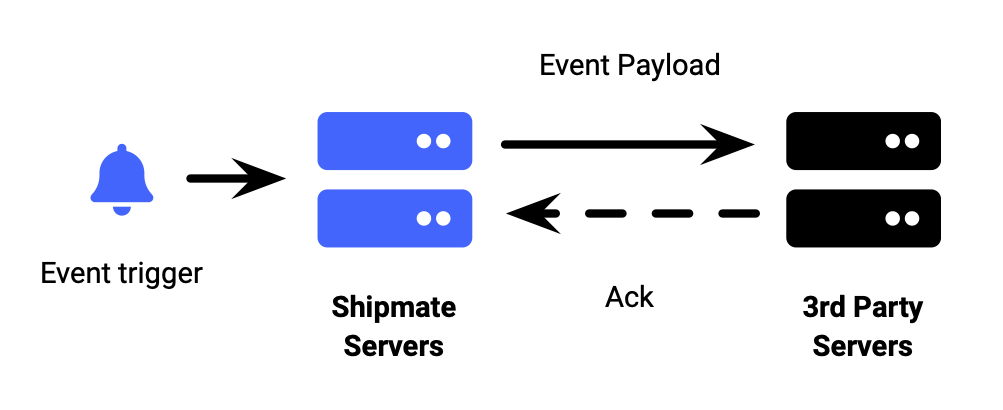
Webhook Events
Shipmate can trigger a webhook for any of the following events:
- SHIPMENT_CREATED – Shipment Created
- SHIPMENT_CANCELLED – Shipment Cancelled
- TRACKING_UPDATED – Tracking Status updated (all events)
- TRACKING_COLLECTED – Tracking Status updates to Collected
- TRACKING_IN_TRANSIT – Tracking Status updates to In Transit
- TRACKING_OUT_FOR_DELIVERY – Tracking Status updates to Out for Delivery
- TRACKING_DELIVERED – Tracking Status updates to Delivered
- TRACKING_DELIVERY_FAILED – Tracking Status updates to Delivery Failed
Configuring Webhooks
To set up a new webhook, choose the Webhooks option from the Advanced section of the Settings area on the Shipmate web portal, located at the bottom of the Settings page.
Click the New Webhook button to start creating your new webhook. This form requires the handler URL you wish us to send requests to, the event trigger, and you may provide a name to distinguish this webhook.
Advanced options allow you to configure the data type of the payload we send – either HTTP form-encoded "raw POST", or JSON. Additionally you may configure request rates and how we should handle error conditions.
Finally you may opt to narrow down this webhook to make requests from just a particular channel integration, or otherwise leave as All Shipments to send webhooks regardless of the source.
You will then be taken to the newly created webhook's overview screen, where you can monitor recent requests, trigger a test event and also copy the auth token, which will be sent as the auth_token attribute in each of our payloads for this webhook, helping you verify the authenticity of the request's origin.

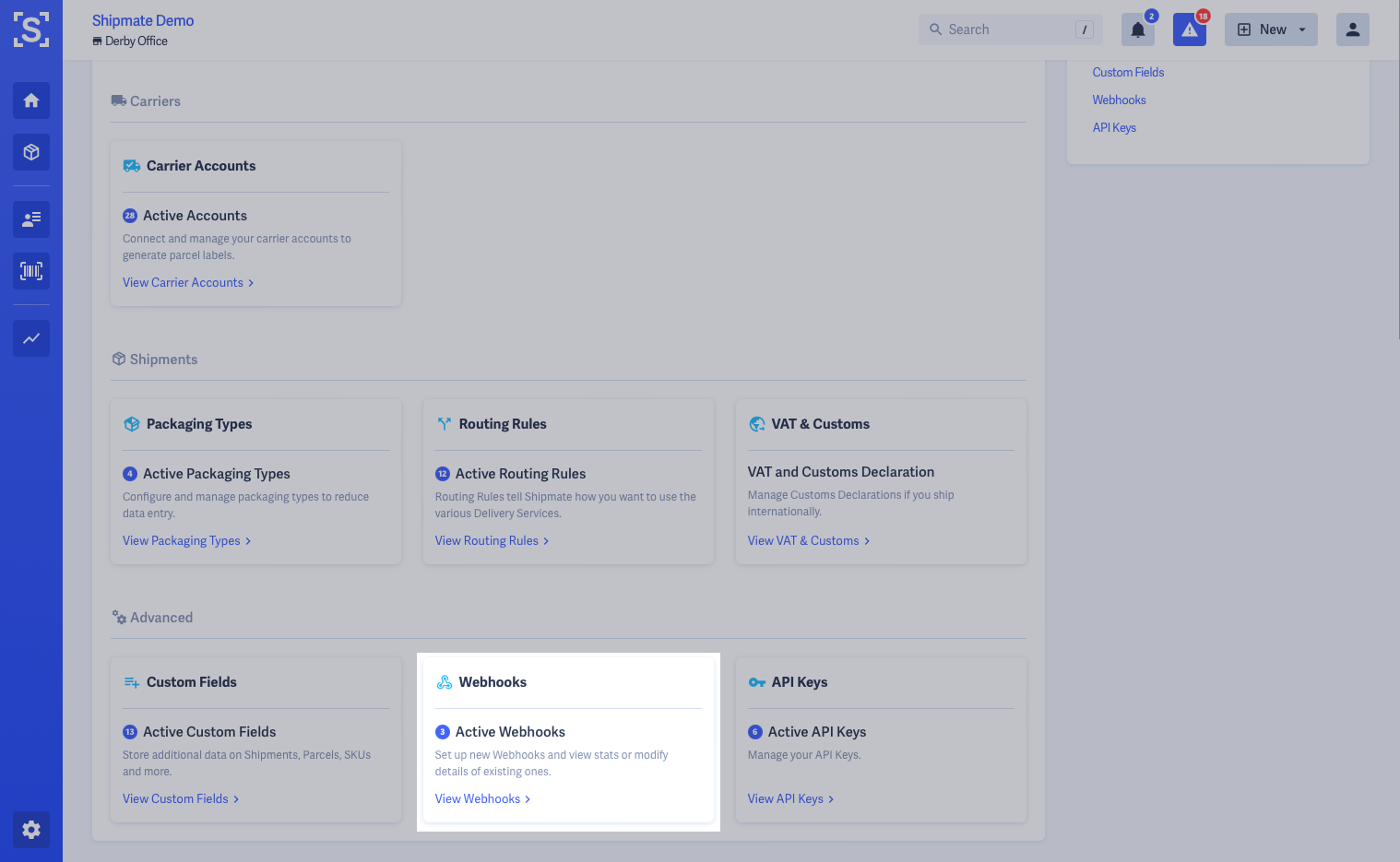
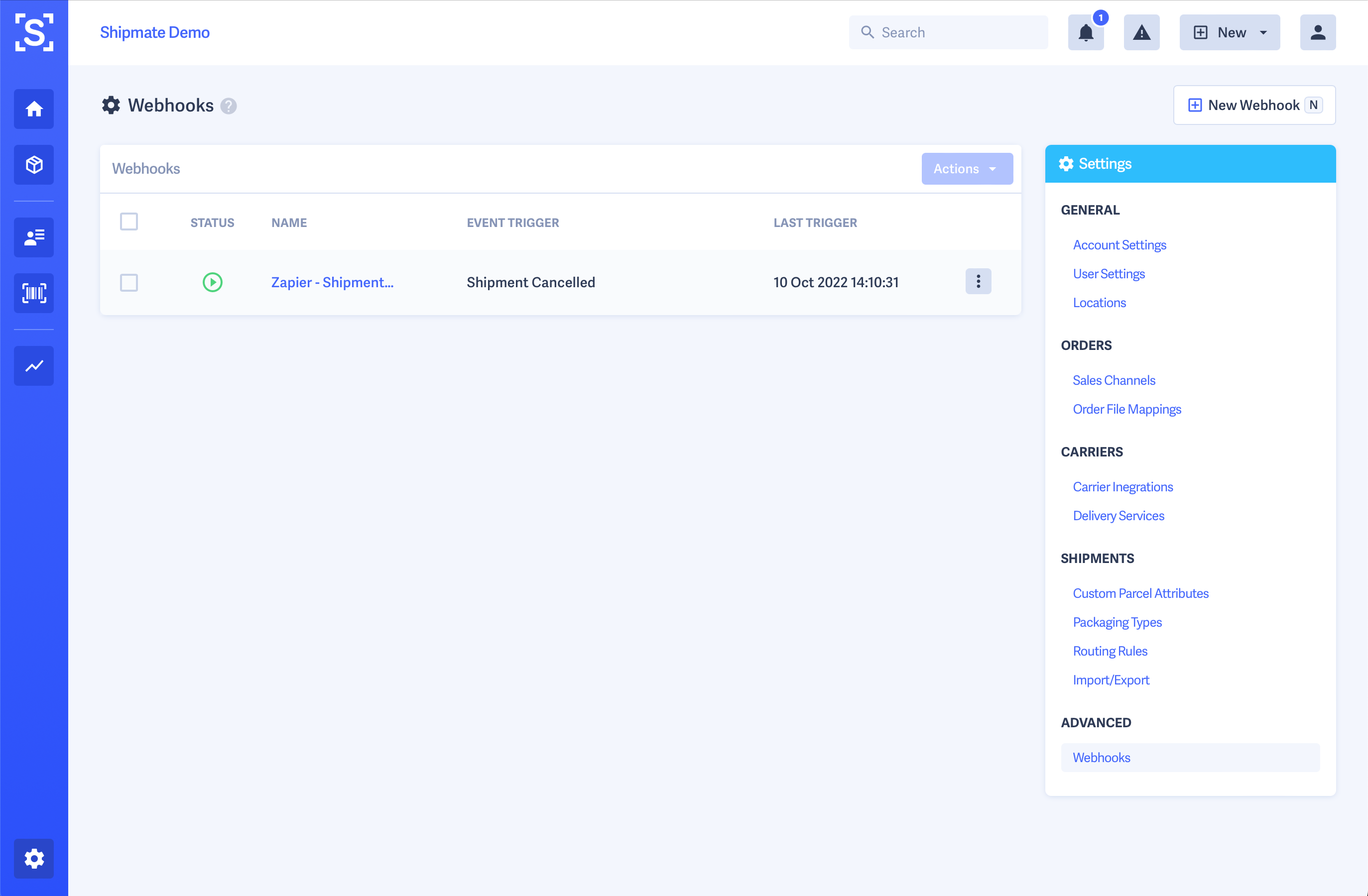
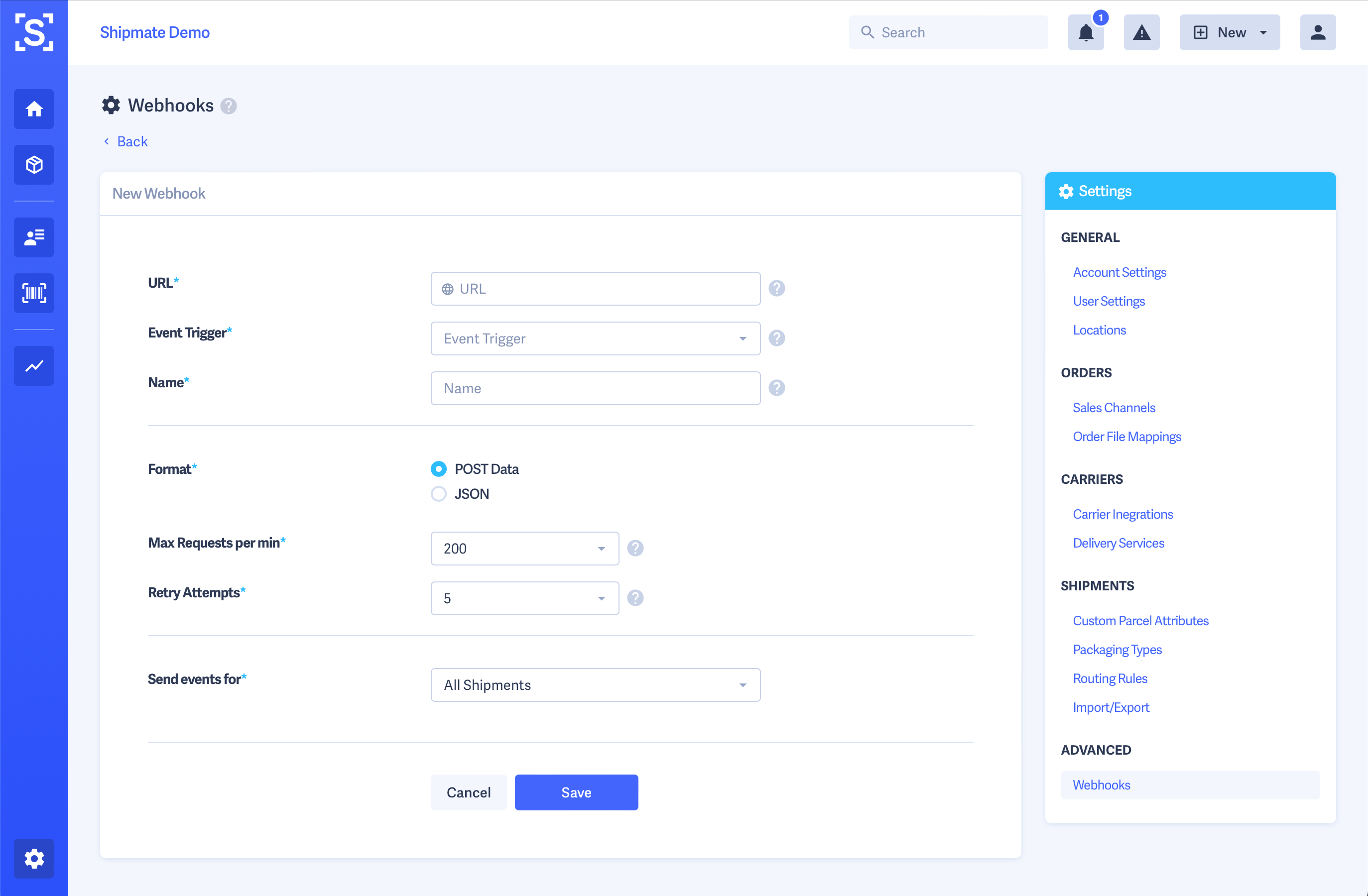
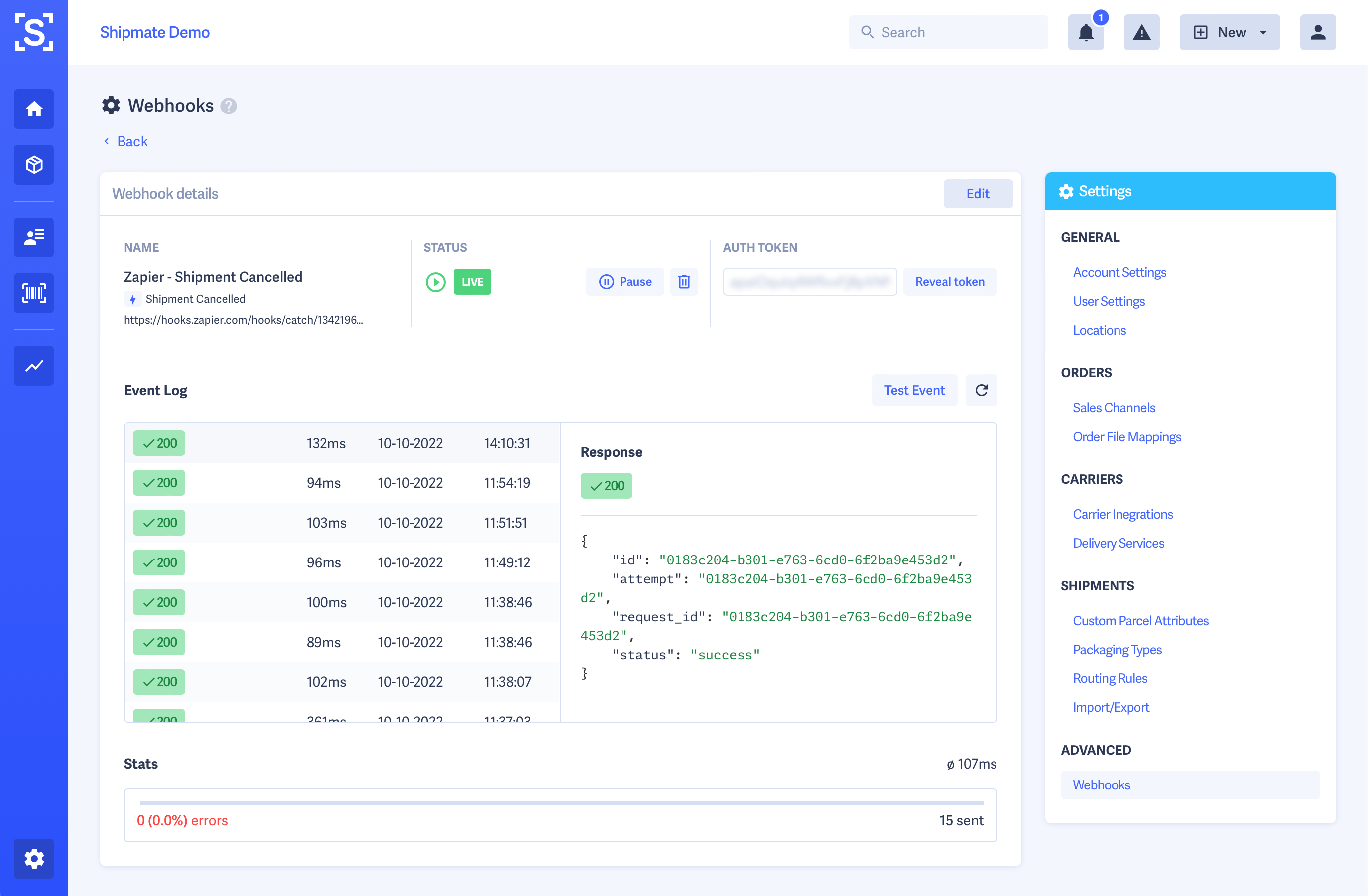
Writing Your Event Handler
You may maintain separate handler endpoints for each individual event, or write a single endpoint to handle each of the event types you wish to listen for, using the event attribute in our payload to distinguish between event types.
Your handler may accept either HTTP form-encoded "raw POST" data, or JSON, according to the selection you made when configuring your webhook.
Your handler endpoint should return an HTTP 200 success code upon processing the webhook request.
You can configure the number of retry attempts Shipmate will make in case of a failed request, and we have a back-off policy enabled to spread out the time between failed requests, taking into consideration moderately lengthy downtimes.
Your webhook may be paused automatically if we receive multiple error responses or are unable to reach your server, to minimise spurious requests originating from our servers. You may reinstate paused webhooks at any time from the Settings area of the web portal.
Payload Structure (Tracking)
Tracking events are sent on a per-parcel basis. This means you may receive several similar webhooks for multiple parcels in the same shipment, providing they all progress through the carrier network at the same pace.
Parameters:| Parameter | Description | Type |
|---|---|---|
auth_token |
The Webhook authentication token | String |
request_token |
Request token / idempotency token | String |
event |
Webhook event name e.g., TRACKING_DELIVERED | String |
shipment_reference |
Order number or Shipment reference | String |
parcel_reference |
Parcel reference | String |
source |
Channel key e.g., shopify_store_1 | String |
order_reference |
Order number | String |
carrier |
Carrier name e.g., DPD | String |
carrier_account |
Carrier integration key e.g., dpd_account_1 | String |
tracking_number |
Carrier tracking number | String |
tracking_event_code |
Tracking event code (from Carrier) | String |
tracking_event_type |
Tracking event stage (e.g., Collected) | String |
tracking_event_name |
Tracking event name (from Carrier) | String |
tracking_event_description |
Full event narrative | String |
tracking_event_time |
Timestamp of tracking event | String |
tracking_url |
Shipmate / co-branded tracking URL | String |
tracking_url_carrier |
Carrier tracking URL | String |
recipient |
Object containing recipient details, with attributes:recipient_full_name recipient_first_name recipient_last_name recipient_email recipient_telephone |
Object |
Payload Structure (Created and Cancelled)
Creation and Cancellation events are sent on a shipment / consignment basis. This includes all parcels within the shipment, so this payload has a slightly different structure listing out the constituent parcel references and tracking references in arrays.
Parameters:| Parameter | Description | Type |
|---|---|---|
auth_token |
The Webhook authentication token | String |
request_token |
Request token / idempotency token | String |
event |
Webhook event name i.e., SHIPMENT_CANCELLED | String |
shipment_reference |
Order number or Shipment reference | String |
parcel_references |
Array of Parcel references | String |
source |
Channel key e.g., shopify_store_1 | String |
order_reference |
Order number | String |
carrier |
Carrier name e.g., DPD | String |
carrier_account |
Carrier integration key e.g., dpd_account_1 | String |
tracking_numbers |
Array of Carrier tracking numbers | String |
custom_fields |
Array of key-value pair objects of Custom Field values, e.g., {"key": "MY_FIELD", "value": "Some Value"} |
Array |
recipient |
Object containing recipient details, with attributes:recipient_full_name recipient_first_name recipient_last_name recipient_email recipient_telephone |
Object |
Payload Structure (ZPL and PDF Labels)
This has the same structure as the Creation and Cancellation events together with an additional labels attribute containing a string of the labels in the requested format.
| Parameter | Description | Type |
|---|---|---|
auth_token |
The Webhook authentication token | String |
request_token |
Request token / idempotency token | String |
event |
Webhook event name i.e., SHIPMENT_CANCELLED | String |
shipment_reference |
Order number or Shipment reference | String |
parcel_references |
Array of Parcel references | String |
source |
Channel key e.g., shopify_store_1 | String |
order_reference |
Order number | String |
carrier |
Carrier name e.g., DPD | String |
carrier_account |
Carrier integration key e.g., dpd_account_1 | String |
tracking_numbers |
Array of Carrier tracking numbers | String |
labels |
ZPL code or Base64-encoded PDF string | String |
custom_fields |
Array of key-value pair objects of Custom Field values, e.g., {"key": "MY_FIELD", "value": "Some Value"} |
Array |
recipient |
Object containing recipient details, with attributes:recipient_full_name recipient_first_name recipient_last_name recipient_email recipient_telephone |
Object |
Payload Structure (PNG Labels)
This has the same structure as the Creation and Cancellation events together with an additional labels attribute containing an array of Base64-encoded PNG labels.
| Parameter | Description | Type |
|---|---|---|
auth_token |
The Webhook authentication token | String |
request_token |
Request token / idempotency token | String |
event |
Webhook event name i.e., SHIPMENT_CANCELLED | String |
shipment_reference |
Order number or Shipment reference | String |
parcel_references |
Array of Parcel references | String |
source |
Channel key e.g., shopify_store_1 | String |
order_reference |
Order number | String |
carrier |
Carrier name e.g., DPD | String |
carrier_account |
Carrier integration key e.g., dpd_account_1 | String |
tracking_numbers |
Array of Carrier tracking numbers | String |
labels |
Array of Base64-encoded PNG strings, one for each label | Array |
custom_fields |
Array of key-value pair objects of Custom Field values, e.g., {"key": "MY_FIELD", "value": "Some Value"} |
Array |
recipient |
Object containing recipient details, with attributes:recipient_full_name recipient_first_name recipient_last_name recipient_email recipient_telephone |
Object |
Testing a Webhook
You may trigger test events as you develop and test your implementation. Simply navigate to the webhook you wish to test, from Settings > Advanced > Webhooks, then click the Test Event button.
You are able to edit Shipment, Order and Parcel reference values that we send in the payload of the test event, to assist you with your testing and reconciling data across systems. Other values are fixed and should be treated as an example.
You can monitor the response we receive from your server by clicking the refresh button in the top-right of the event log table.
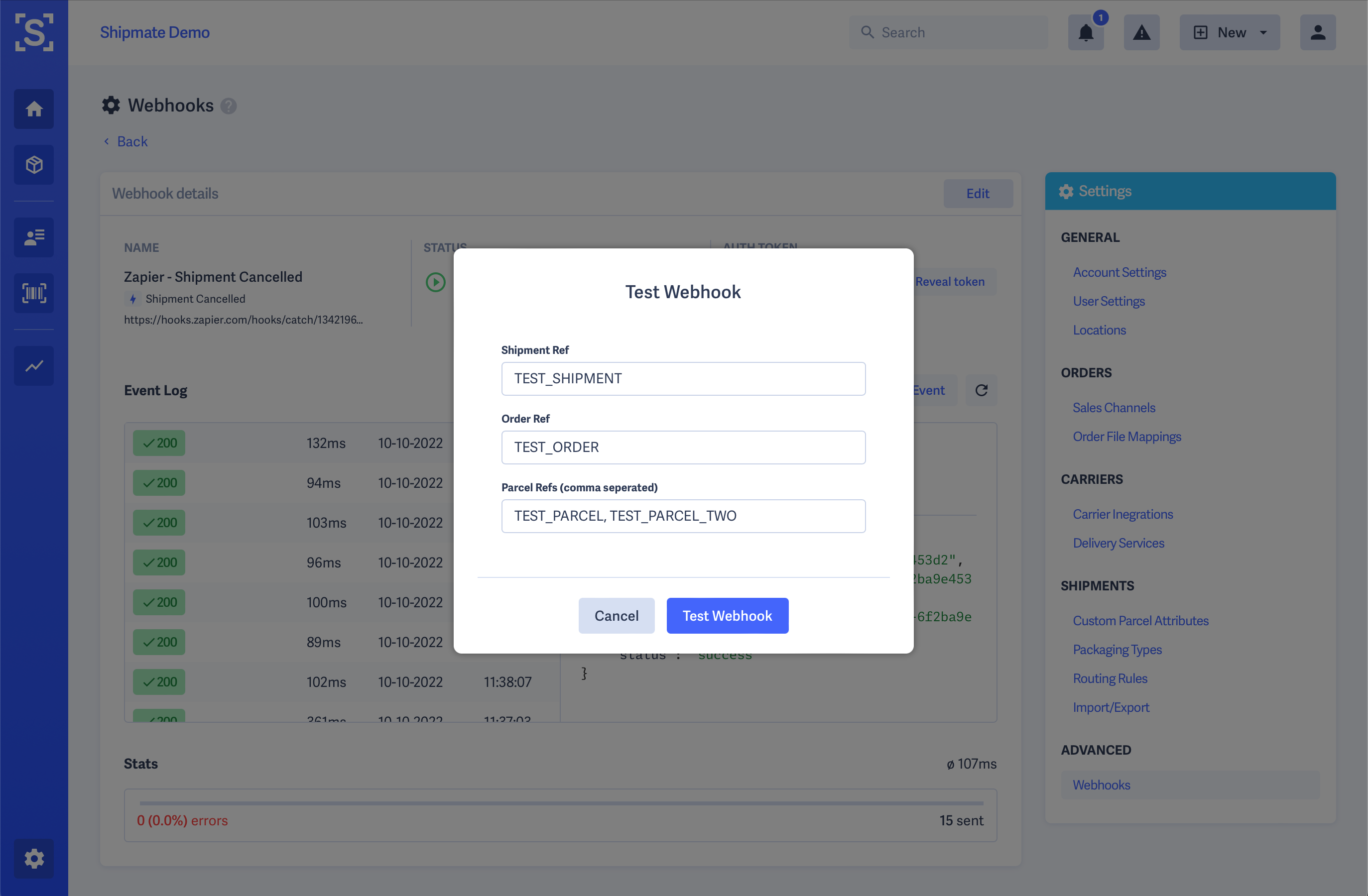
Zapier Example
Zapier is a popular platform used to link systems together with minimal technical expertise or developer assistance being required. As such it is frequently used with webhooks to update one system when certain events are triggered in another.
To listen for events being triggered from Shipmate, set up a new Zap using the Webhooks by Zapier app.
From the three Event options offered, select the Catch Hook option. Zapier will provide you with a URL to send events to, and provide further options for linking data from the webhook and your chosen app when you test your event.
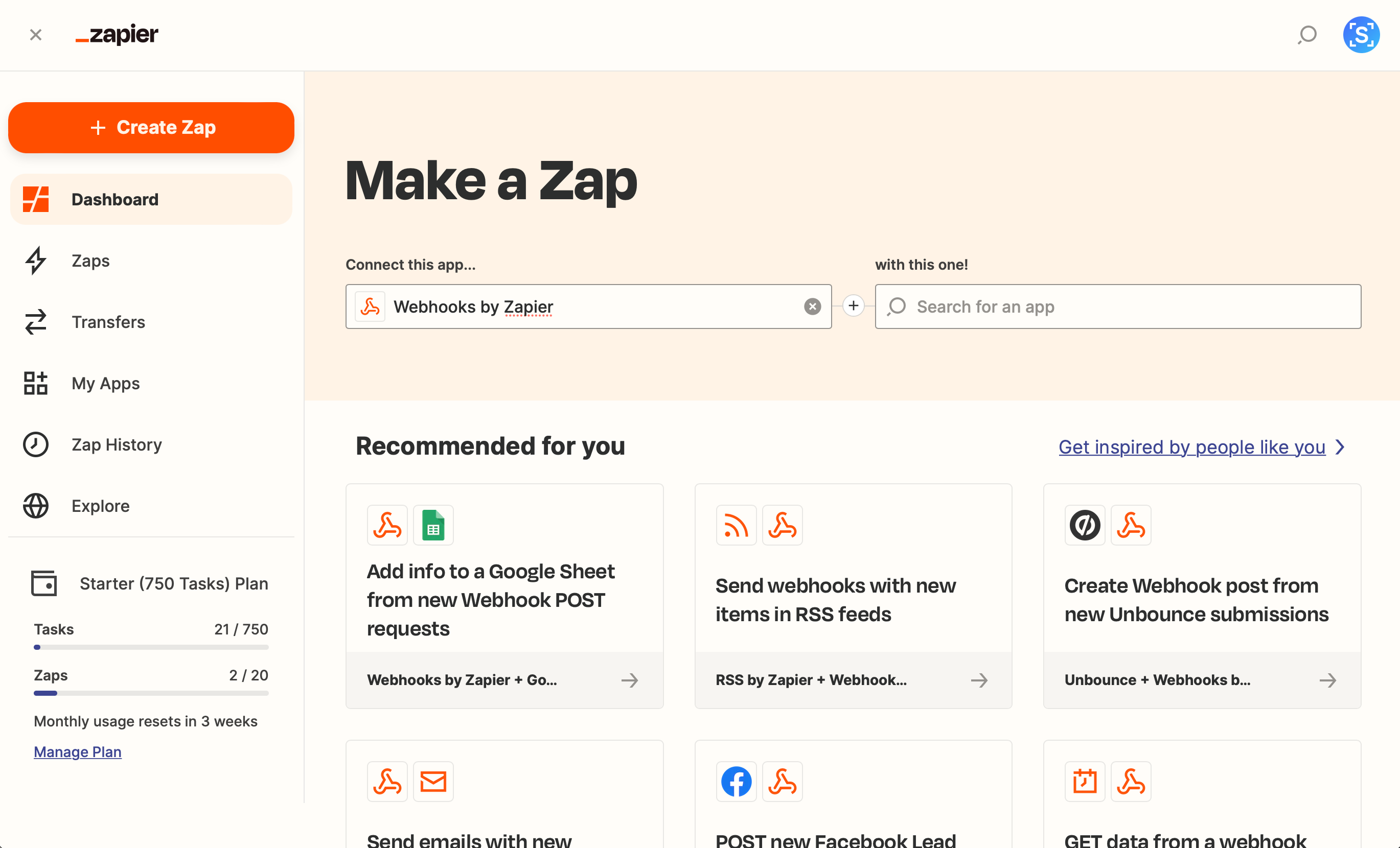
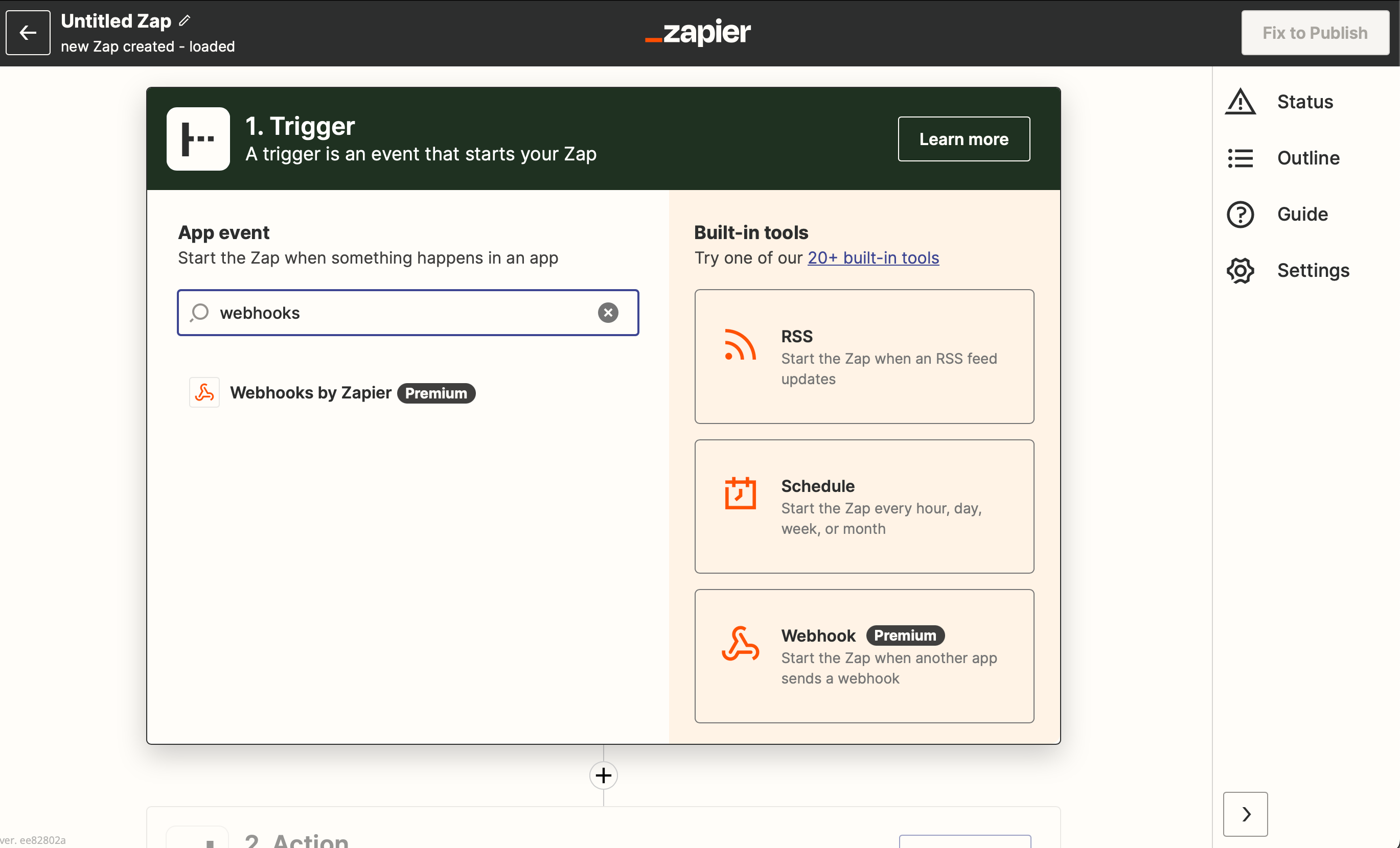
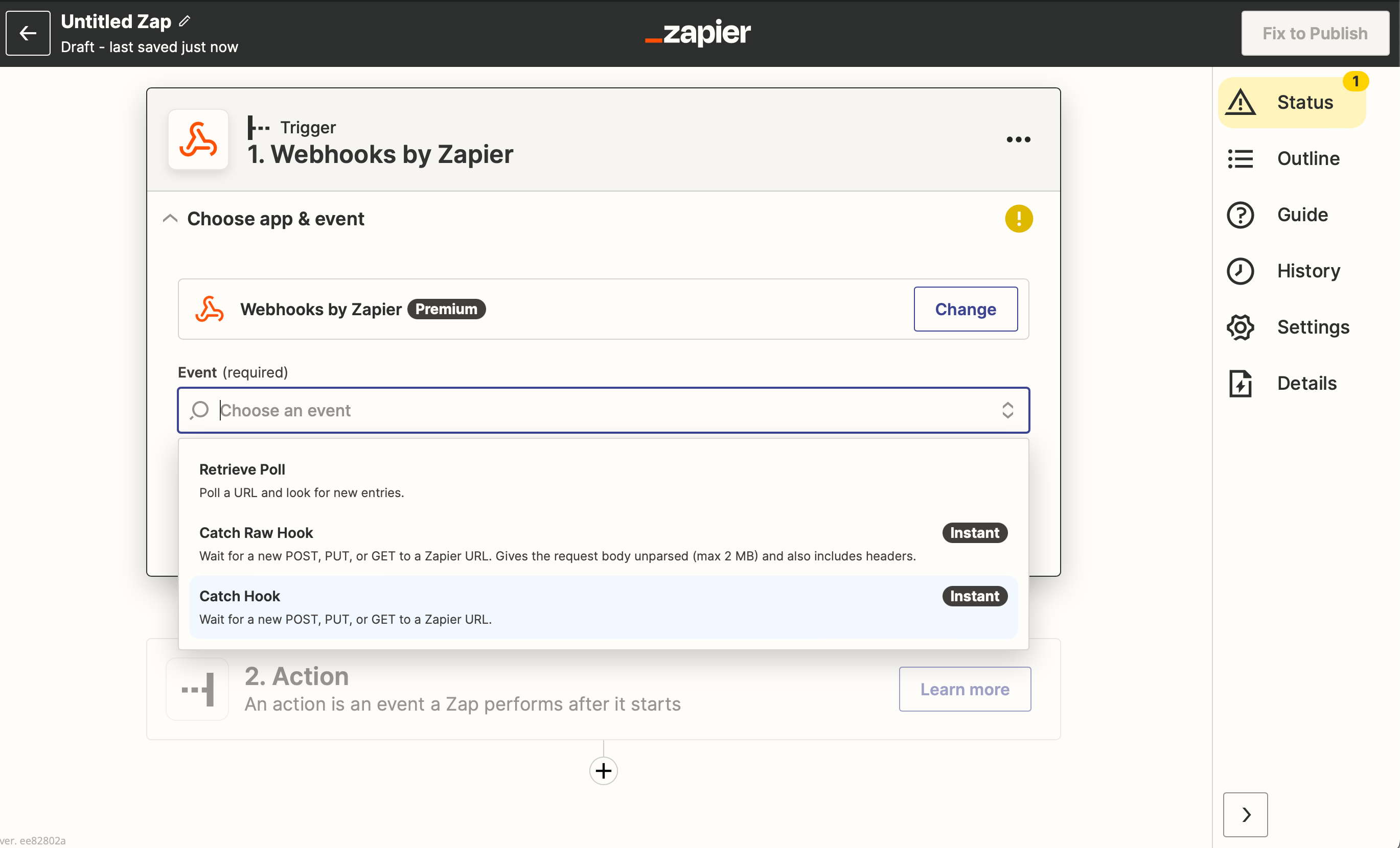
Further Information
Version History
Version 1.2.7 - September 2025
Updates include:
- Print Labels method now accepts
printer_keyattribute for compability with the Print Server App.
Version 1.2.6 - June 2025
Updates include:
- SKU Object
hazard_codesattribute has been removed in favour of using advanced Custom Fields. - Shipment Object now accepts
printer_keyattribute for compability with the Print Server App. POST /shipmentsnow responds withidanddespatch_locationattributes.
Version 1.2.5 - March 2025
Updates include:
- Shipment Object now accepts
recipient_ukims_numberattribute to supply the Recipient UKIMS number when required for shipments from Mainland UK to Northern Ireland.
Version 1.2.4 - January 2025
Updates include:
- NEW FEATURE – Brands can now be listed, retrieved and applied to Shipments
Version 1.2.3 - October 2024
Updates include:
- NEW FEATURE – Get Commercial Invoice method retrieves A4 Commercial Invoice PDF
Version 1.2.2 - August 2024
Updates include:
- NEW FEATURE – Containerised Shipments feature supports shipment consolidation services
- Improved – Webhooks now include a new
custom_fieldsattribute in the payload
Version 1.2.1 - April 2024
Updates include:
- SKUs now accept an
image_urlattribute. This downloads a copy of the image and stores it on Shipmate servers to provide consistent functionality with the web portal - SKUs now accept an
activeattribute that defaults totrueto provide consistent functionality with the web portal - SKUs now have both
PUTandPATCHendpoints to conform with RESTful principles
Version 1.2.0 - March 2024
Updates include:
- New API endpoint URL
- Consignments endpoints now known as Shipments.
- Shipment Object now accepts a
customs_declarationattribute - Shipment Object now accepts
recipient_vat_numberandrecipient_eori_numberattributes to supply VAT / EORI numbers for international destinations. - Shipment Object now accepts
print_labelsandprint_to_userattributes to send retrieved labels directly to a connected printer using the Shipmate Desktop App. POST /shipmentsnow returns the estimated delivery date- Customs Declaration Object now accepts 11 additional attributes to assist with creation of Commercial Invoices
- New
POST /shipments/get-servicesendpoint to retrieve Delivery Services, costs and estimated delivery date for Shipments - Items Object now accepts
item_weightanditem_line_id - New Custom Fields functionality for Shipments, Parcels, Contacts and SKUs, replacing Parcel Attributes
- Shipment, Parcel and SKU Objects now accept a
custom_fieldskey => value pair array - New Webhooks containing ZPL, PDF or PNG labels
Breaking changes include:
- All instances of
sender_idreplaced withmerchant_idfor consistency - Authentication response now contains a UUID string for the
user.idanduser.merchant_idvalues instead of numeric GET /servicesresponse now contains a UUID string for theidvalue instead of numericGET /locationsresponse attributeuuidhas been renamedidfor consistencyGET /skusresponse attributeuuidhas been renamedidfor consistencyGET /usersresponse attributeuuidhas been renamedidfor consistencyGET /packaging-optionsresponse, Packaging Type dimensions changed from cm to mm for consistency with SKU dimensionsattributesremoved from Parcel object, replaced withcustom_fieldsGET /shipments/:ref/eventsresponse attributesender_referencerenamedshipment_referencefor consistency
Deprecations include:
- Consignments noun may continue to be used for this version but will be phased out in future versions.
- Shipment Object attribute
service_keyhas been aliased todelivery_service_key.service_keywill be phased out in future versions.
Updates include:
- Ability to set Customs Declaration Export Purpose
Updates include:
- New Get Users method
- New Print to User method
Updates include:
- New API endpoint URL
- Requirement of API Key for all methods
- Ability to upload App Icon
- Locations methods
- SKU Inventory methods
location_codeattribute on POST Consignments method